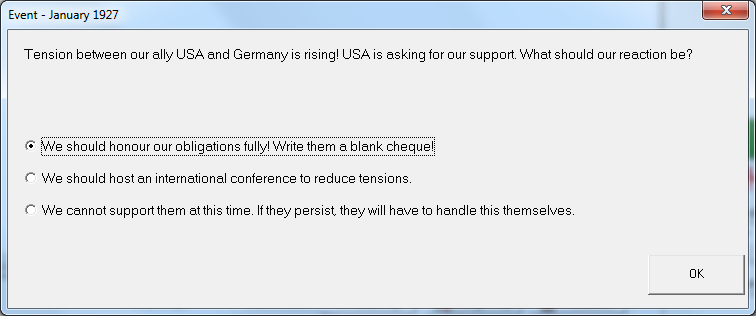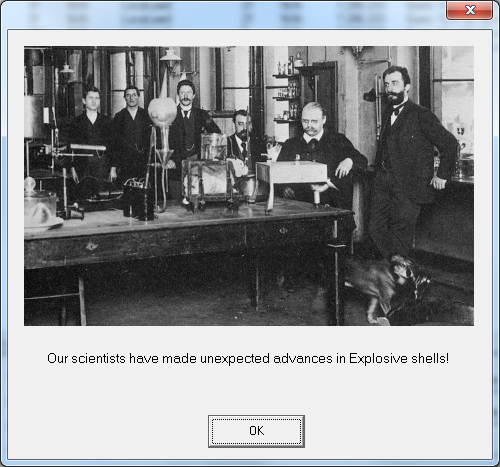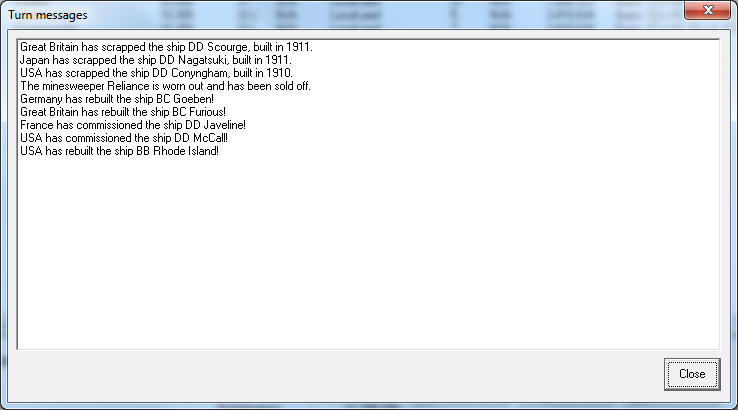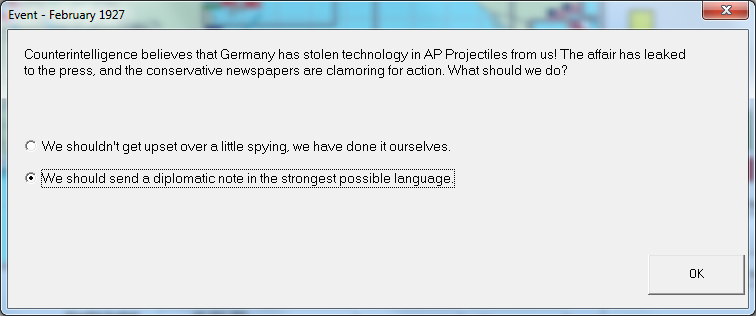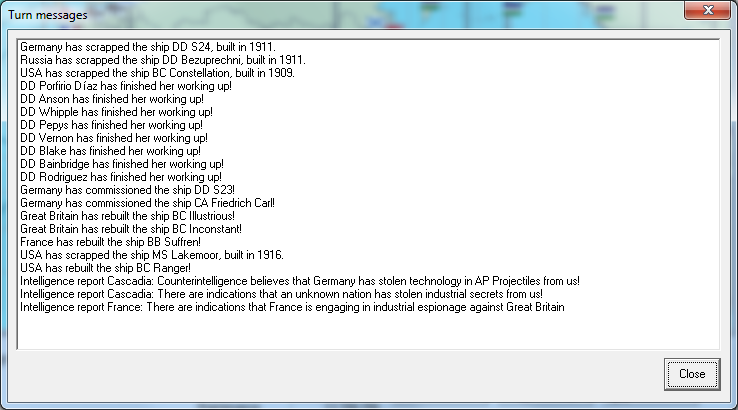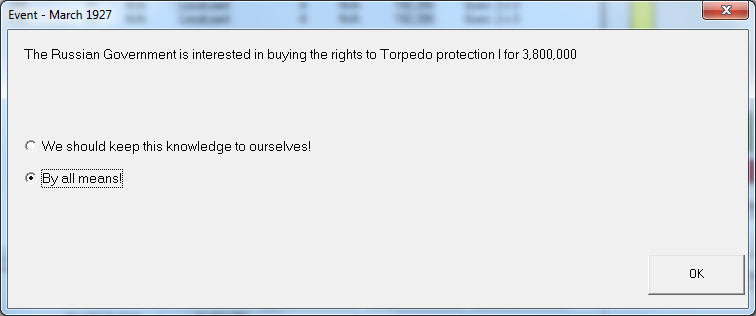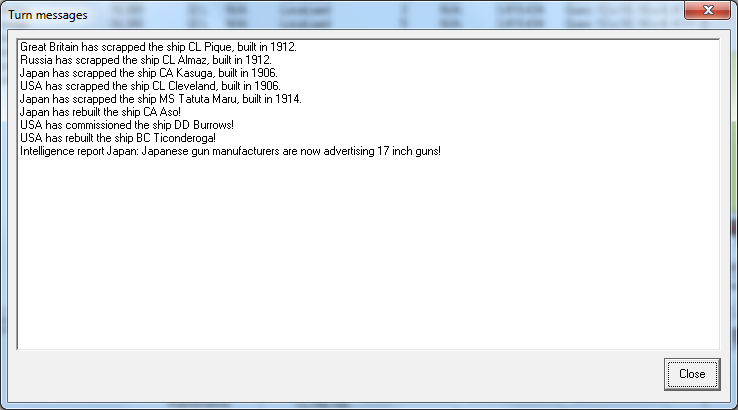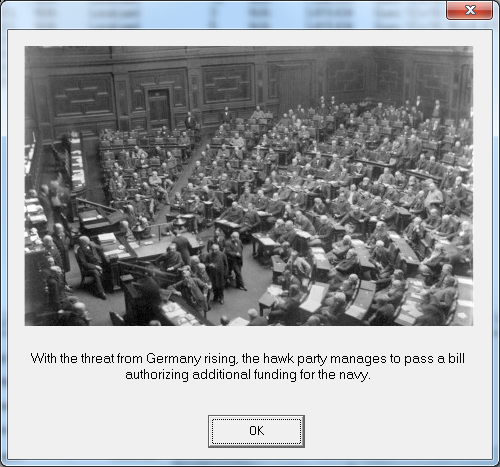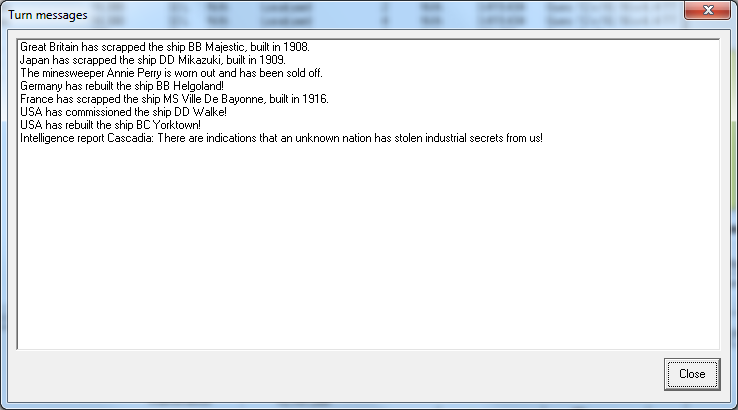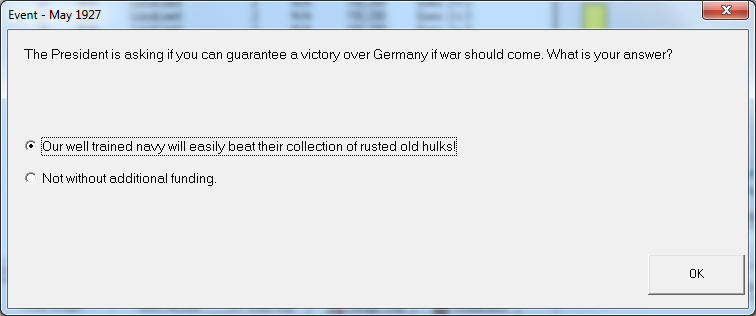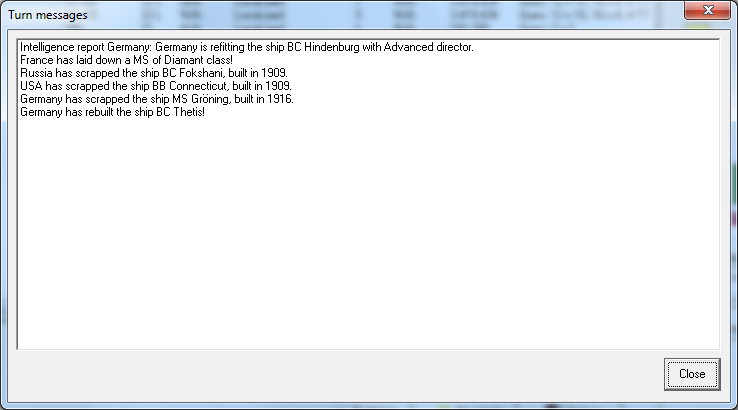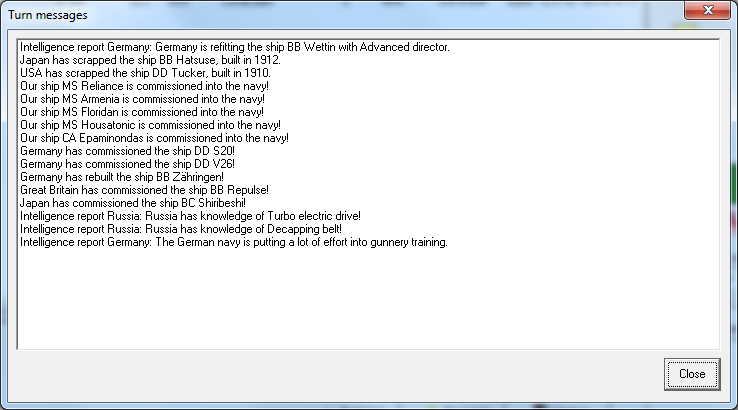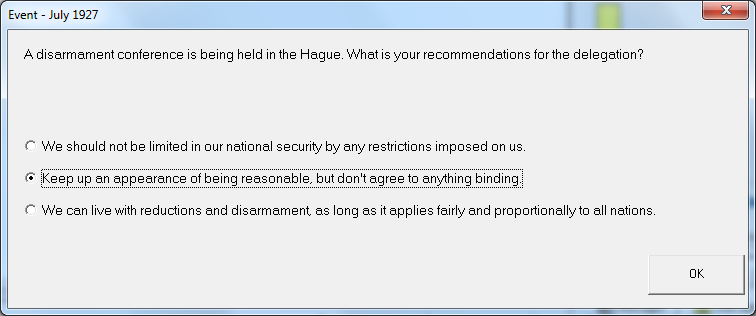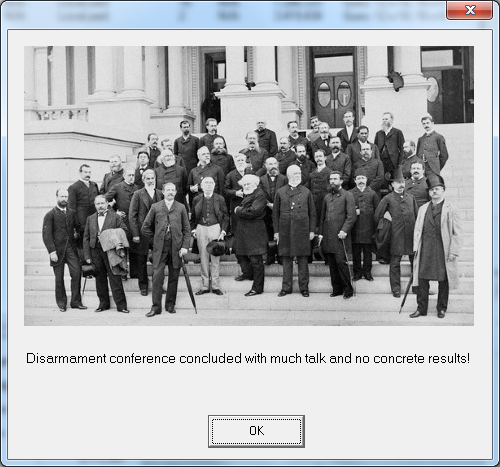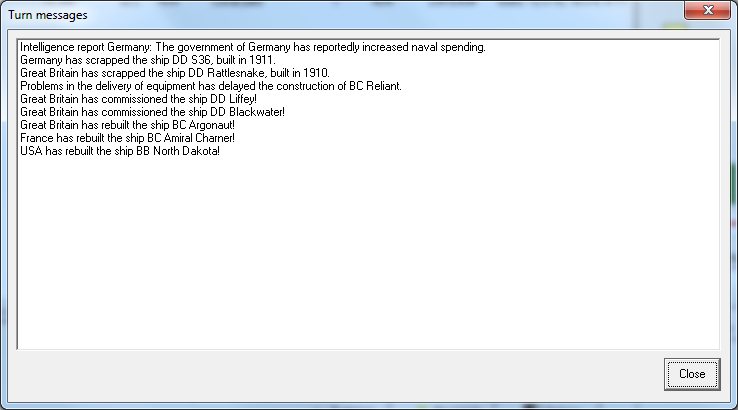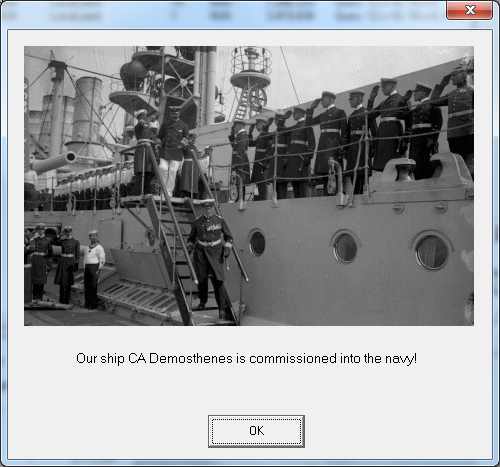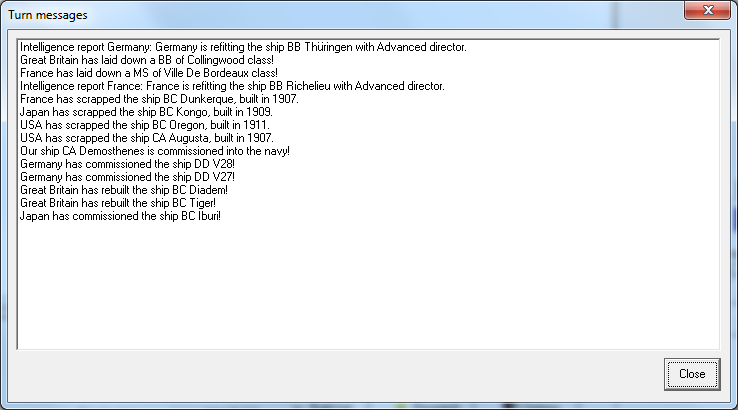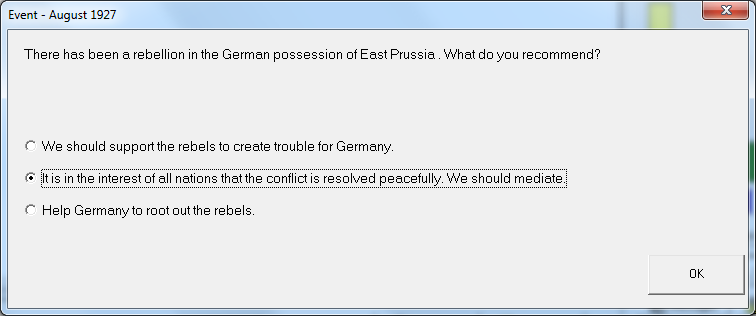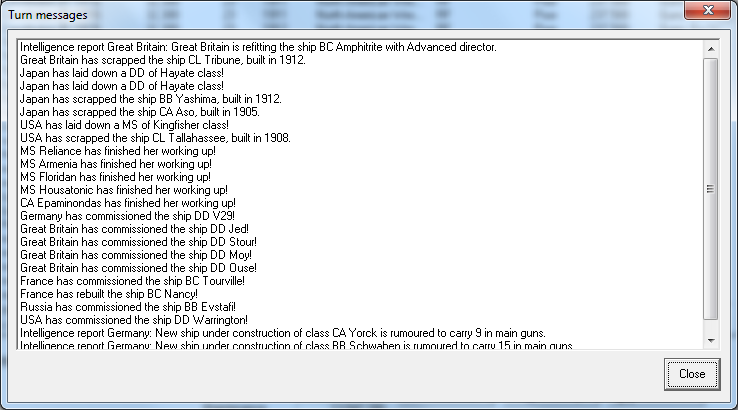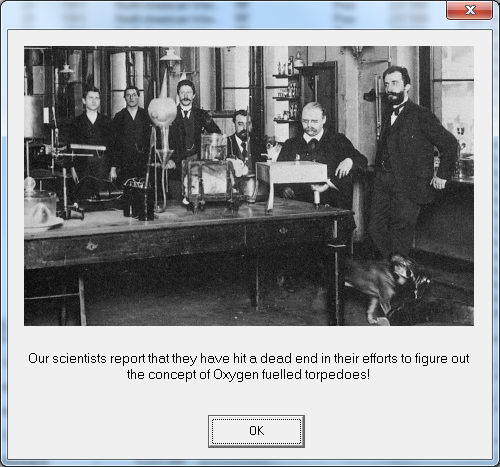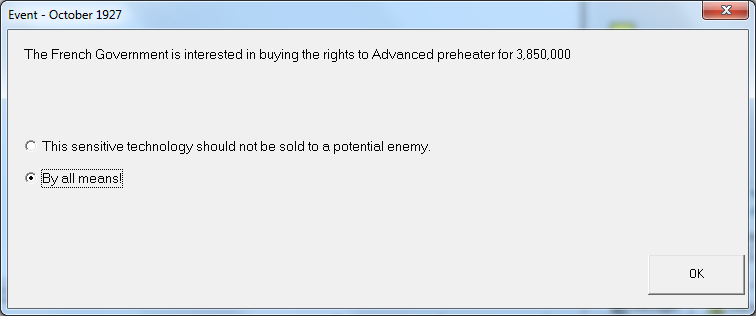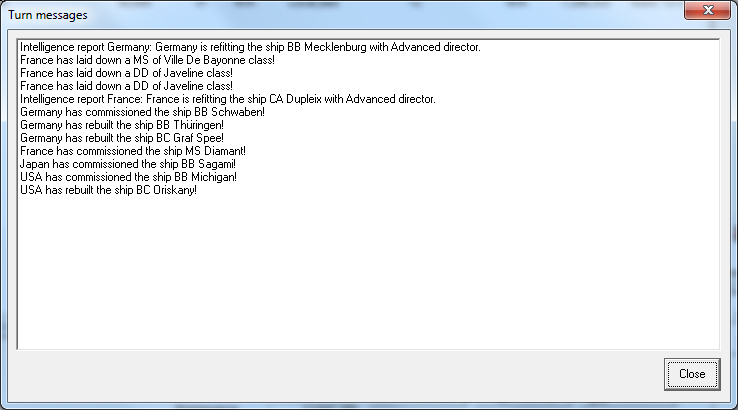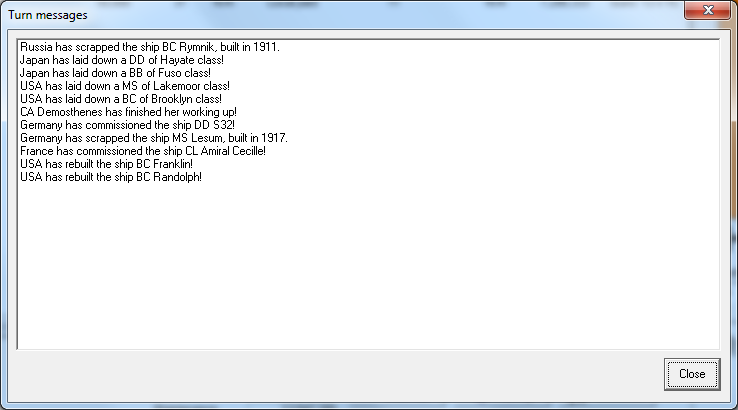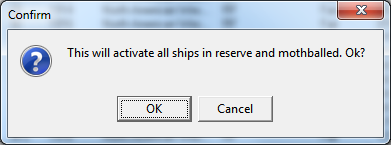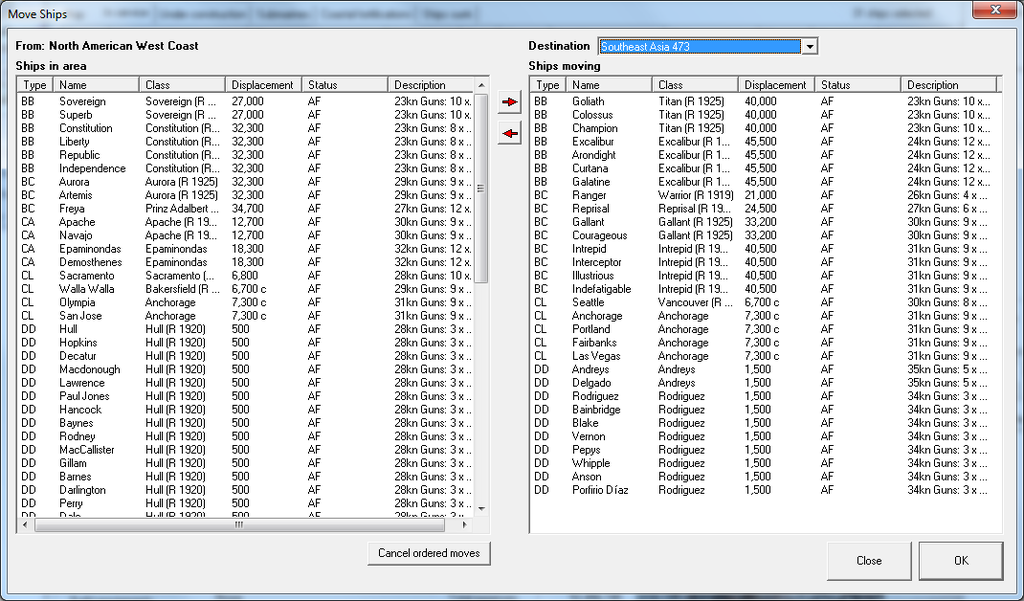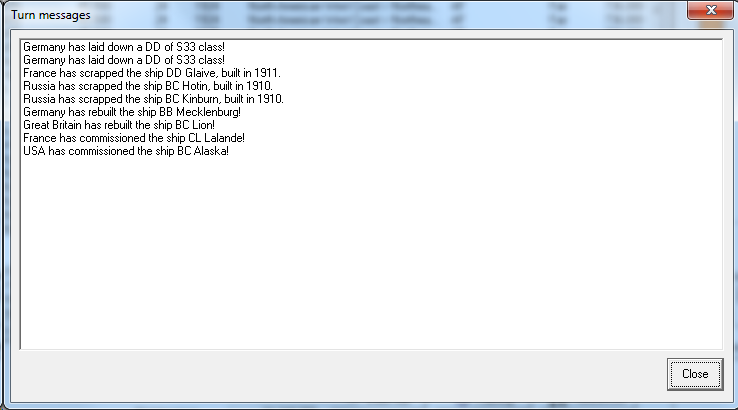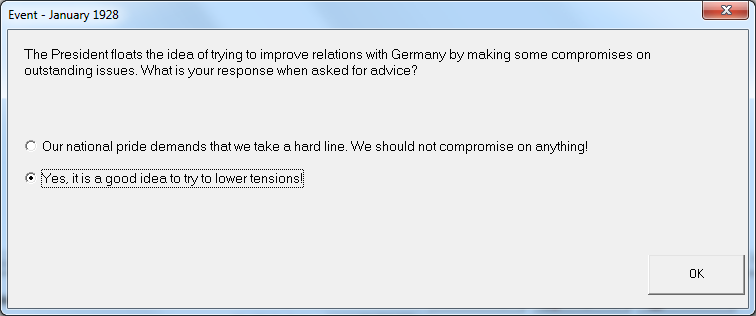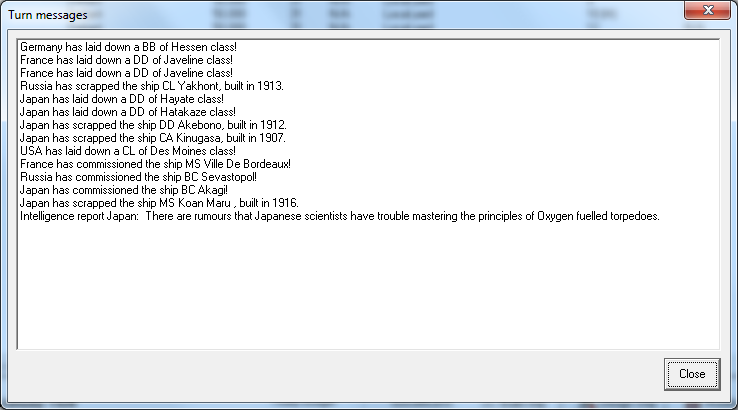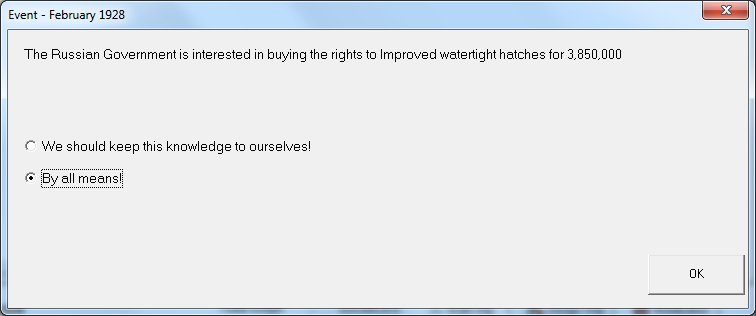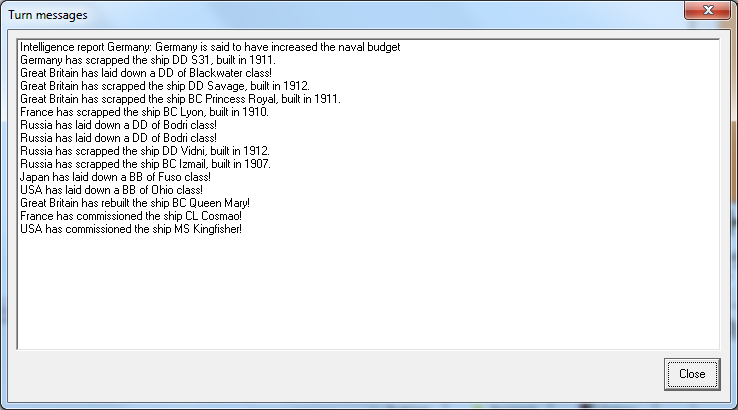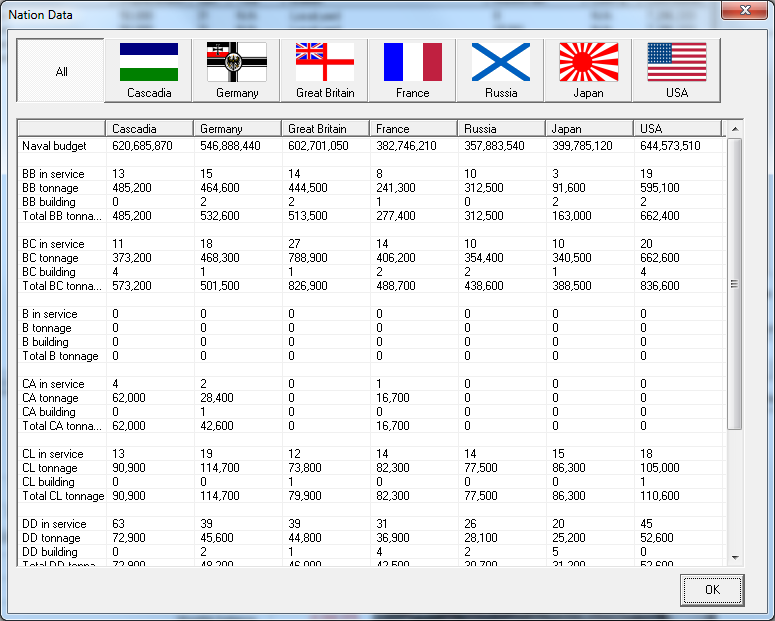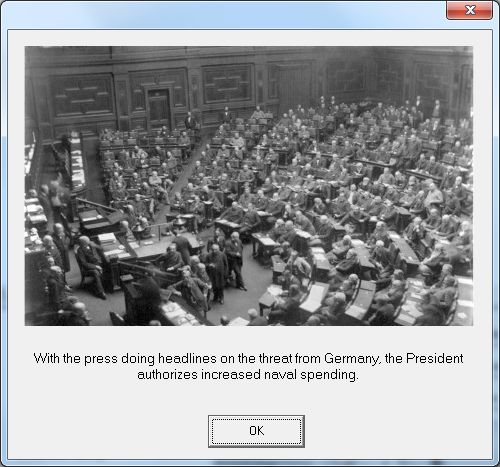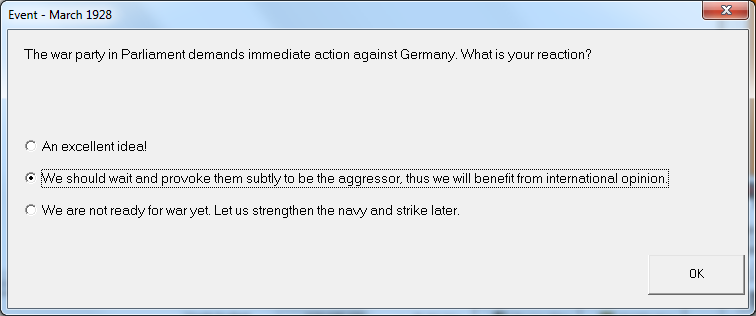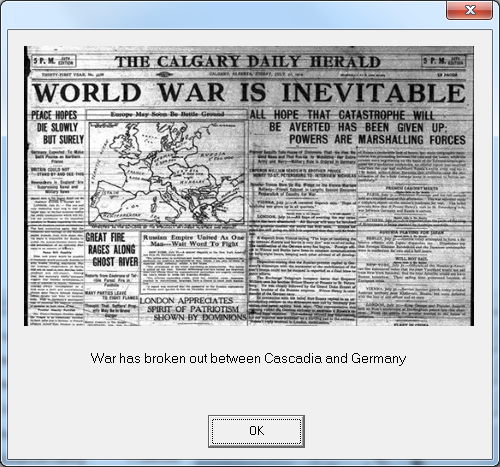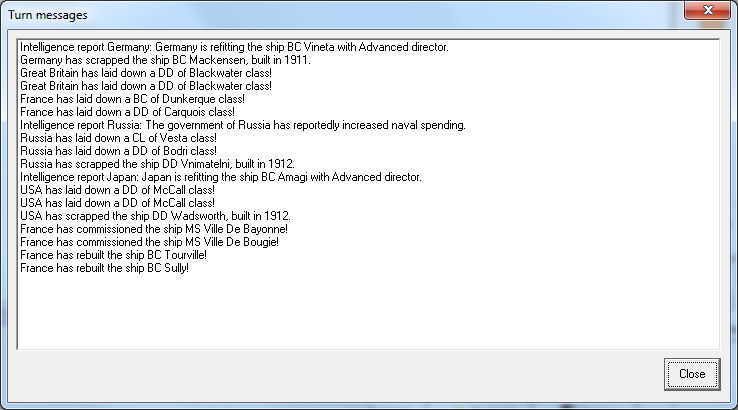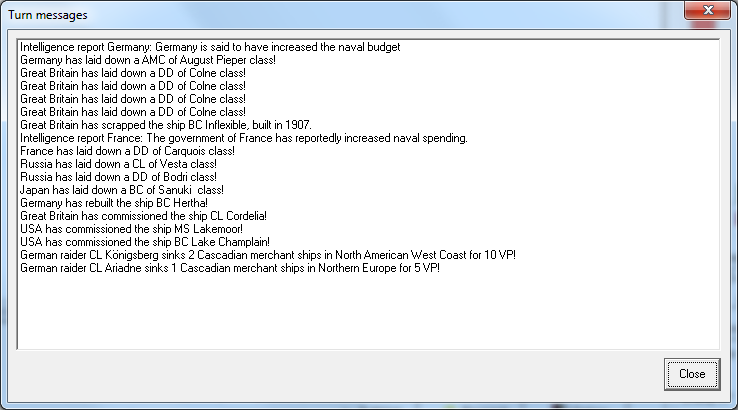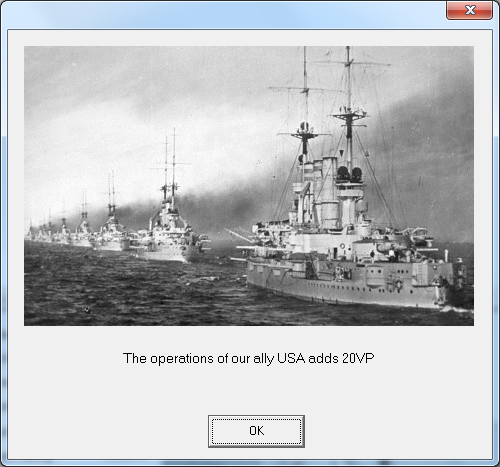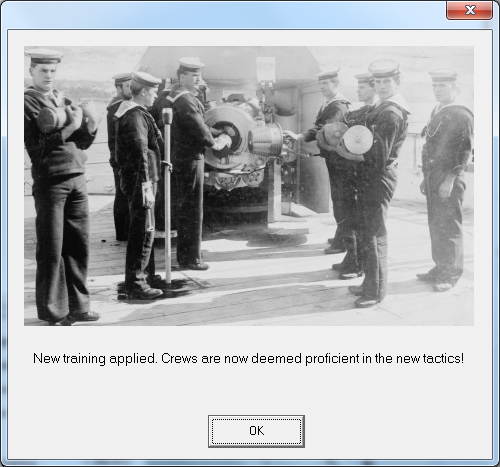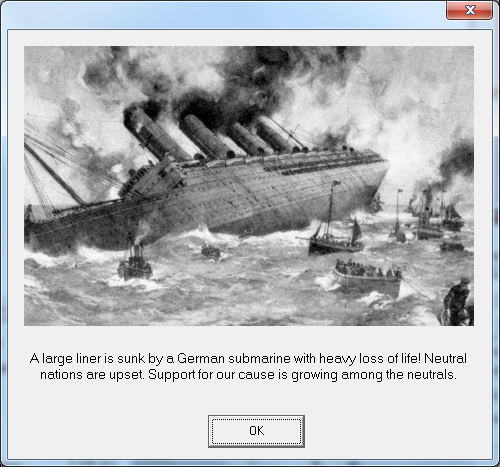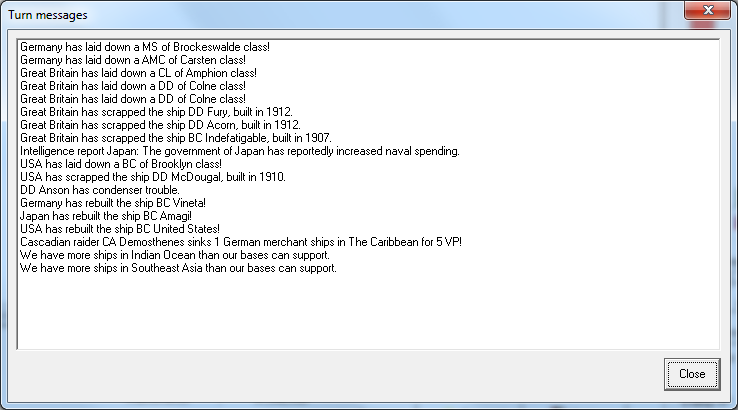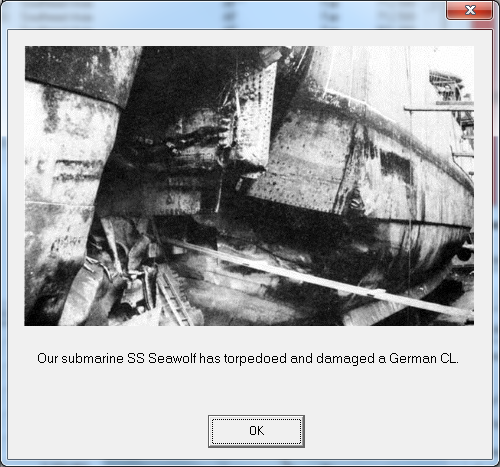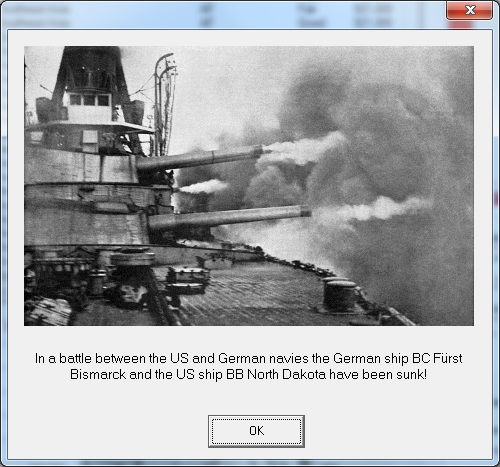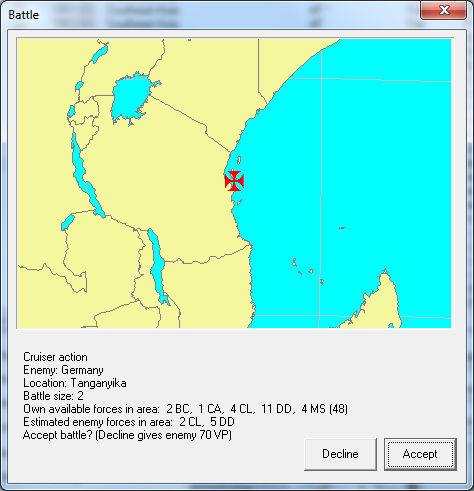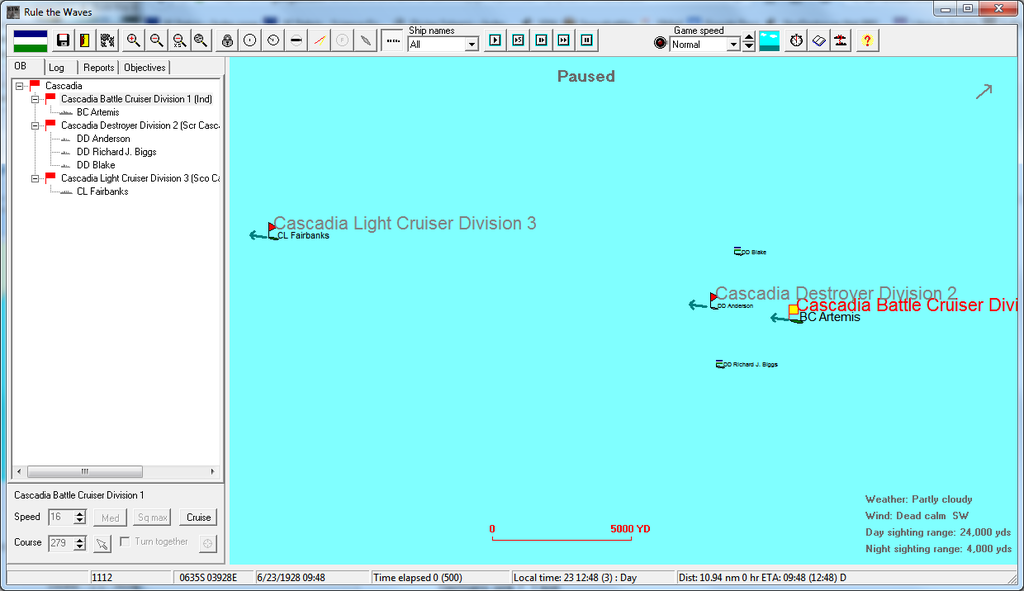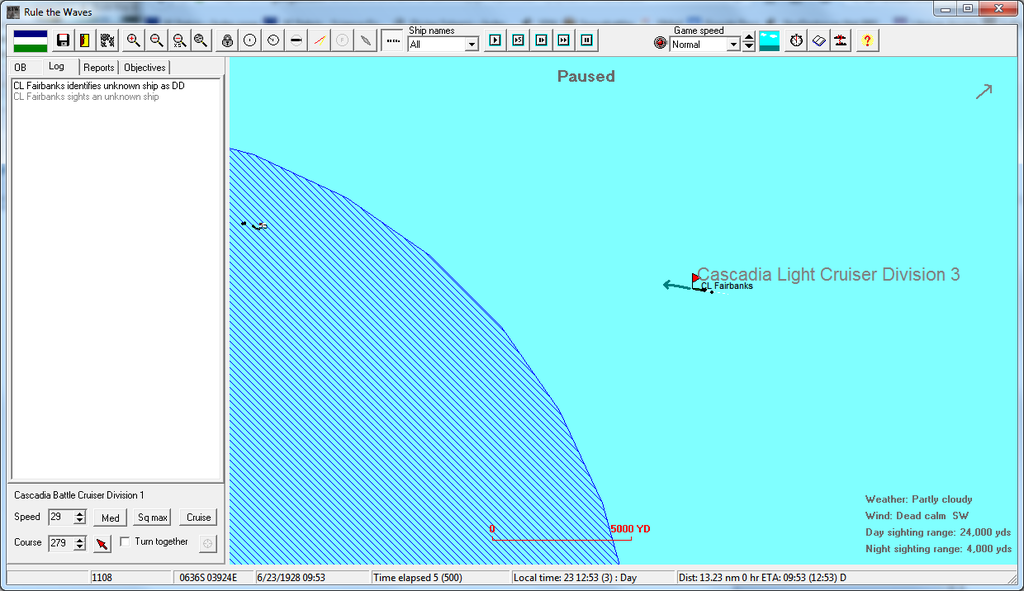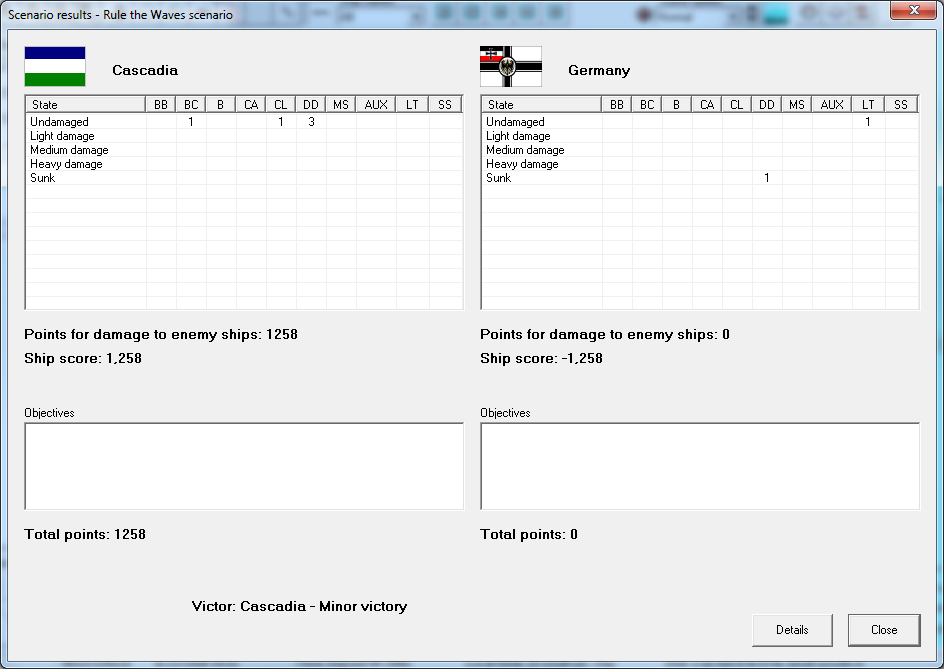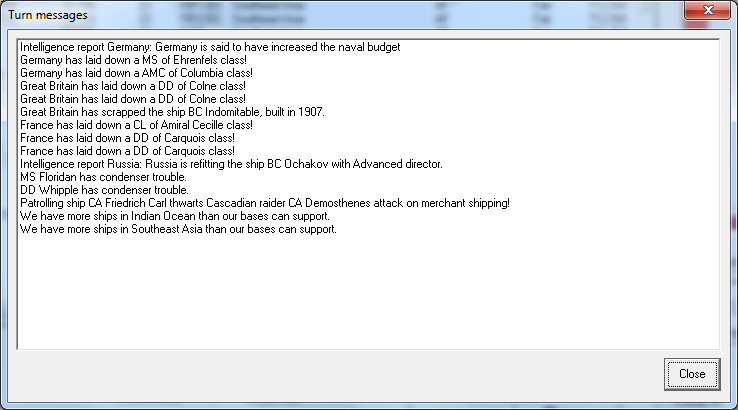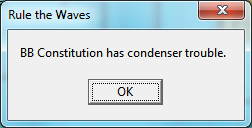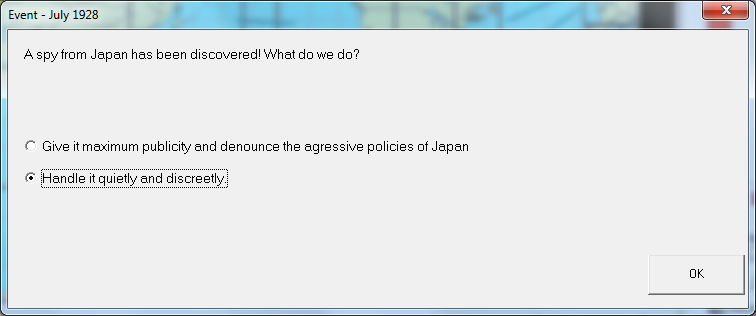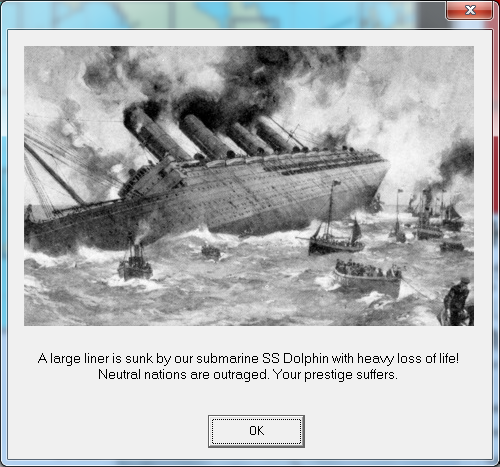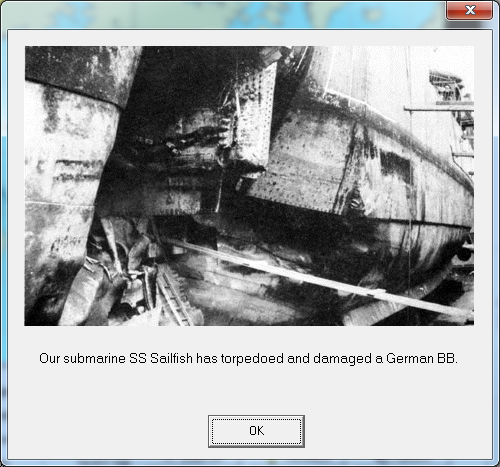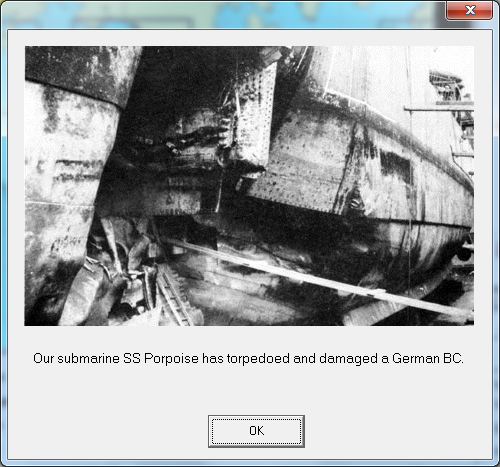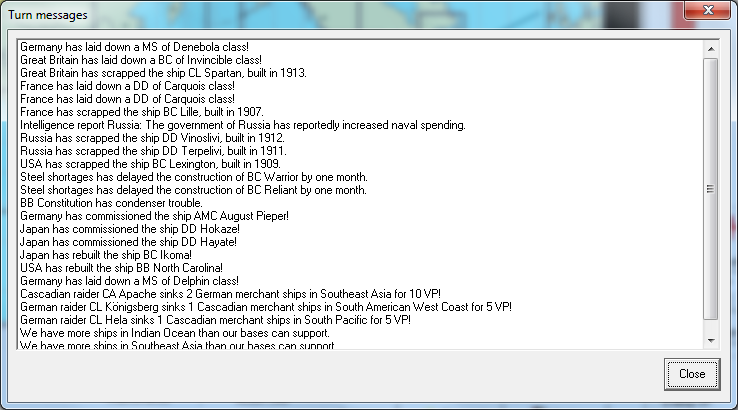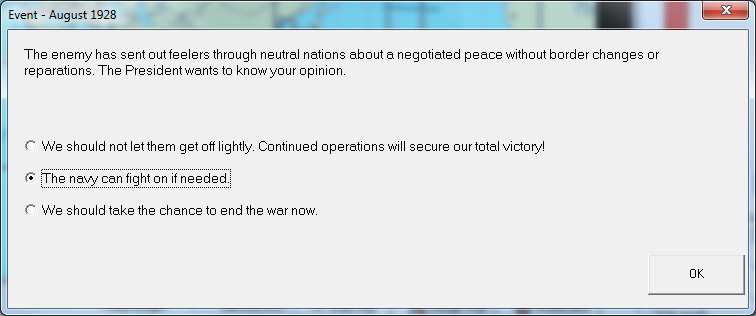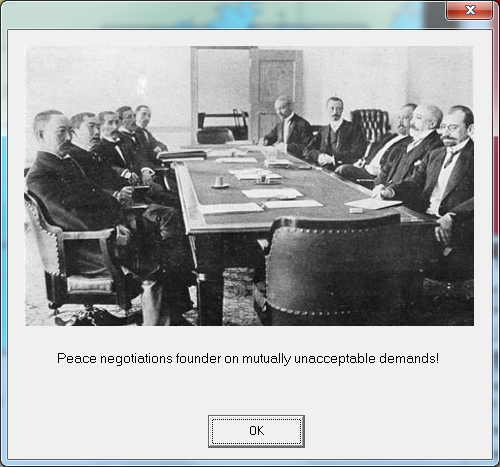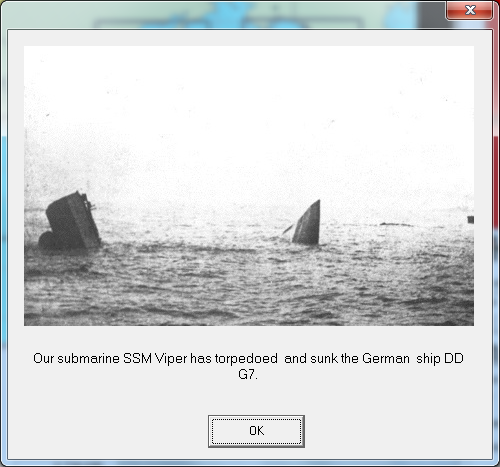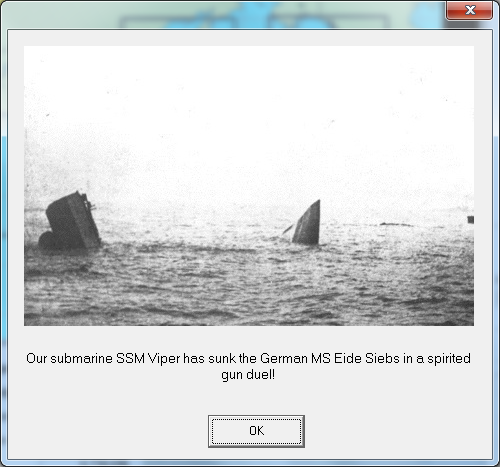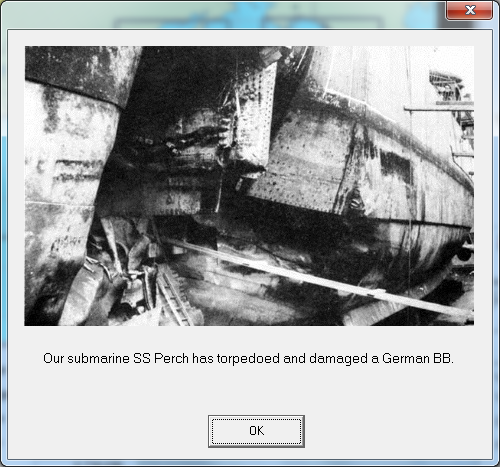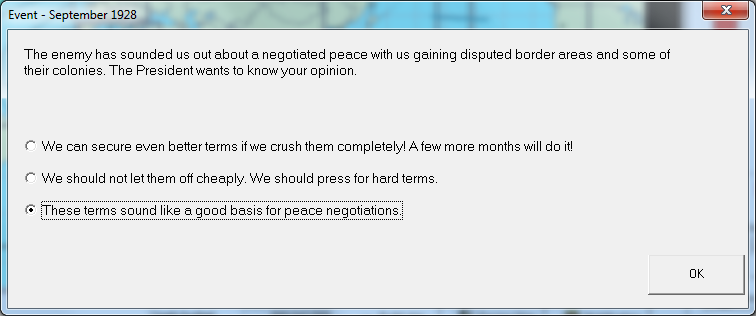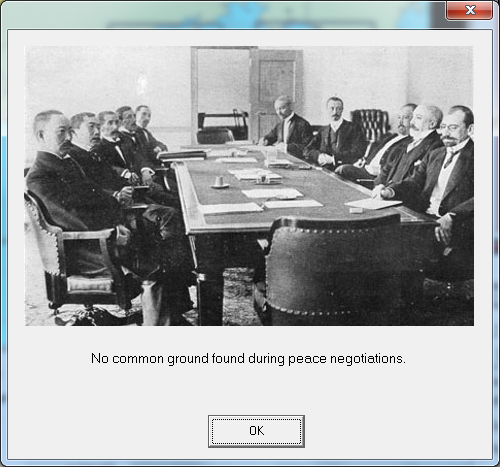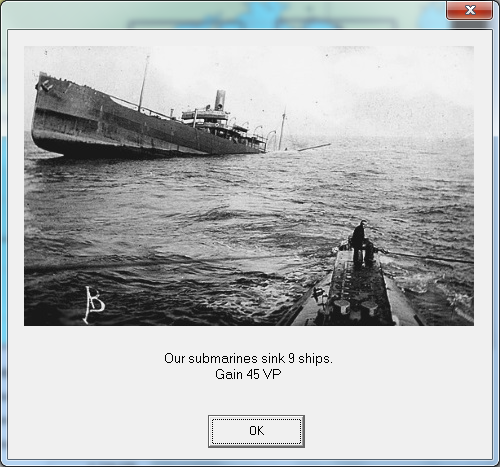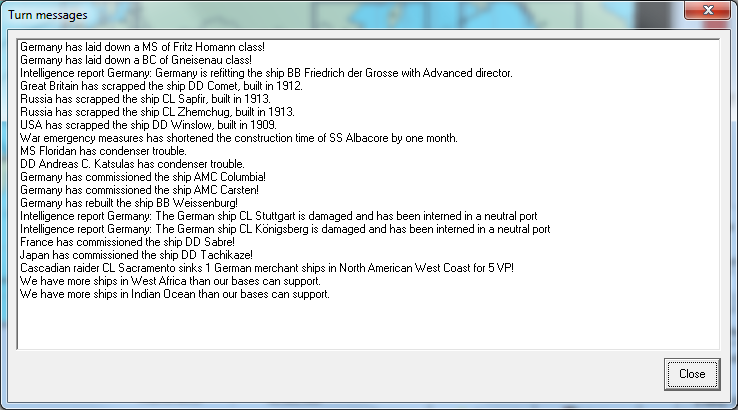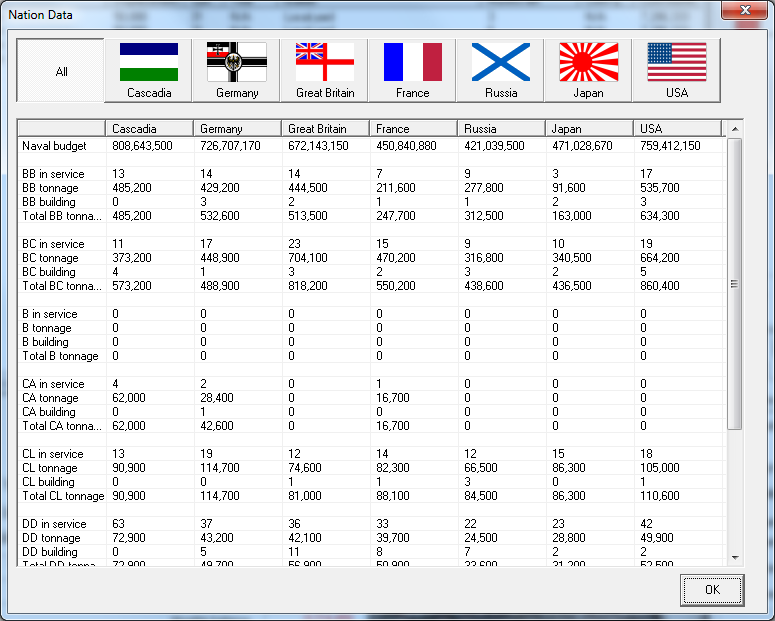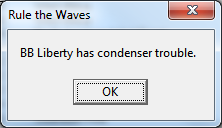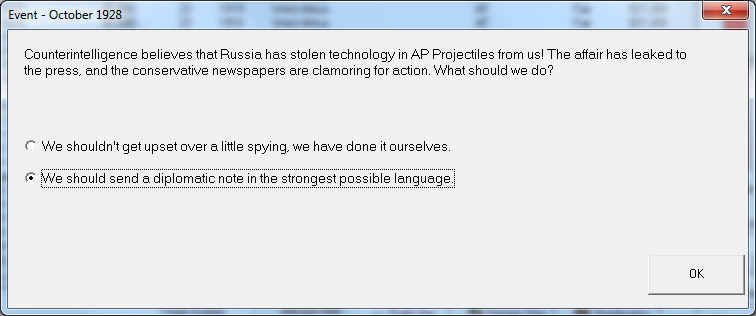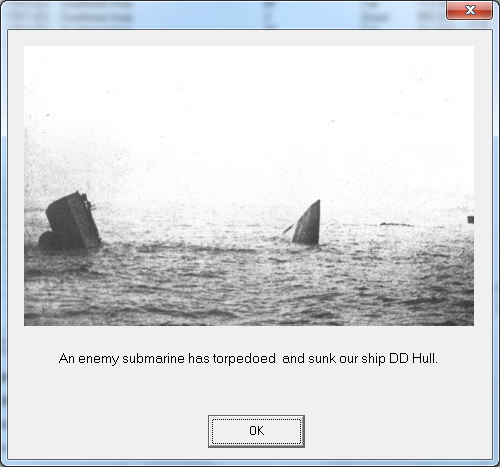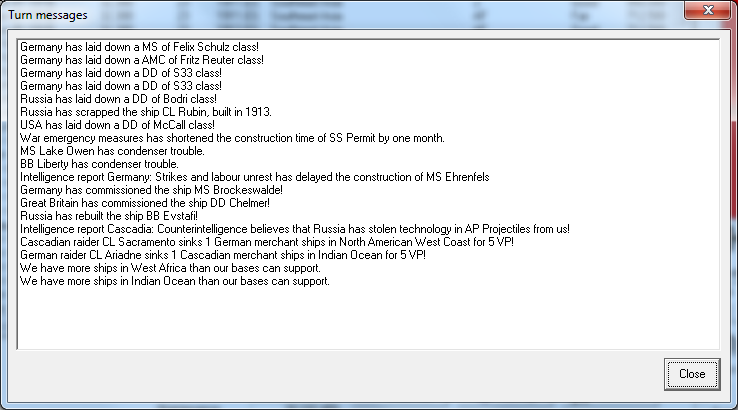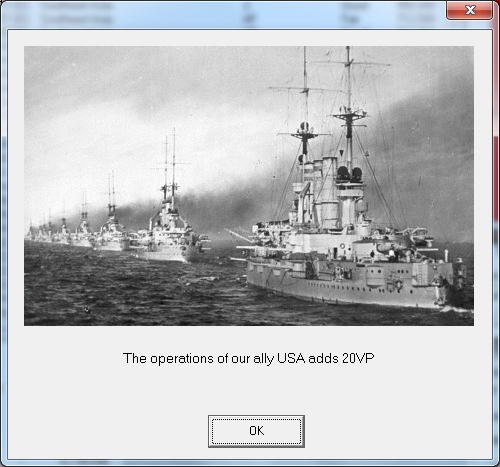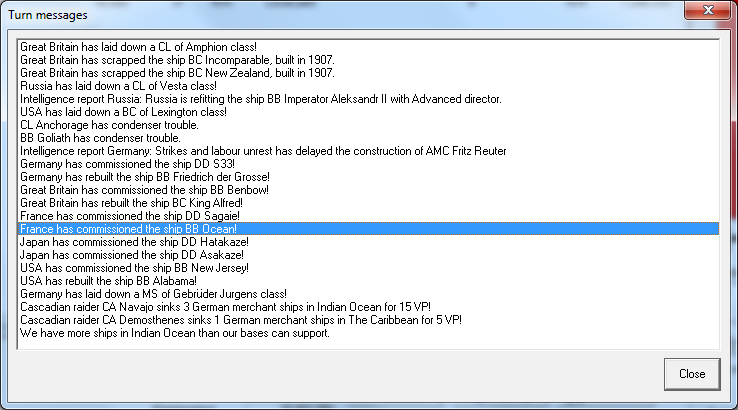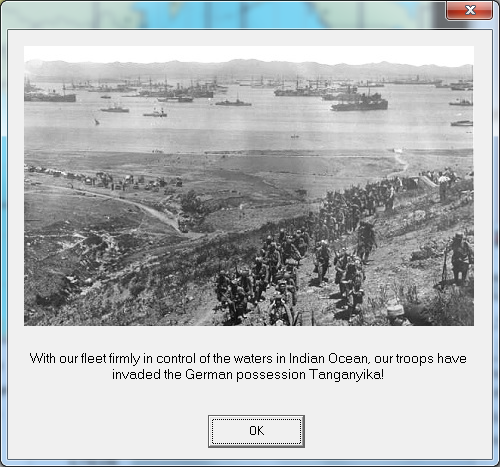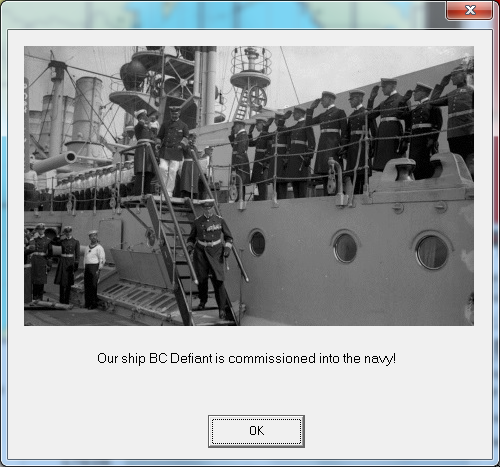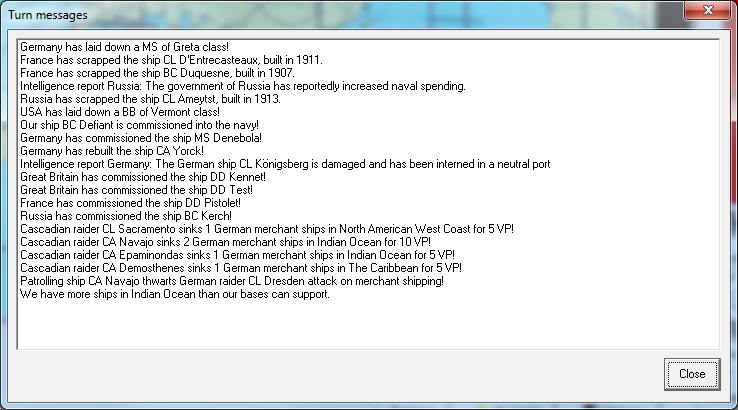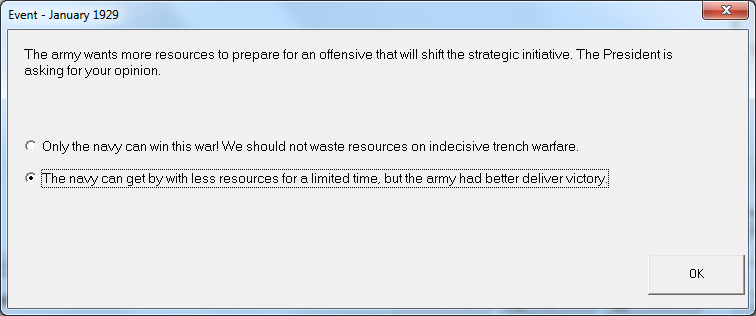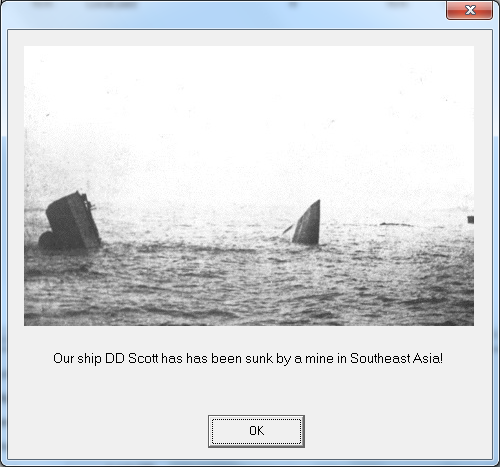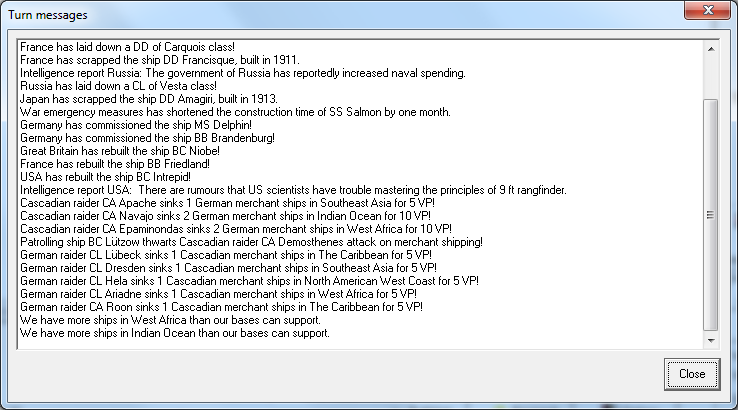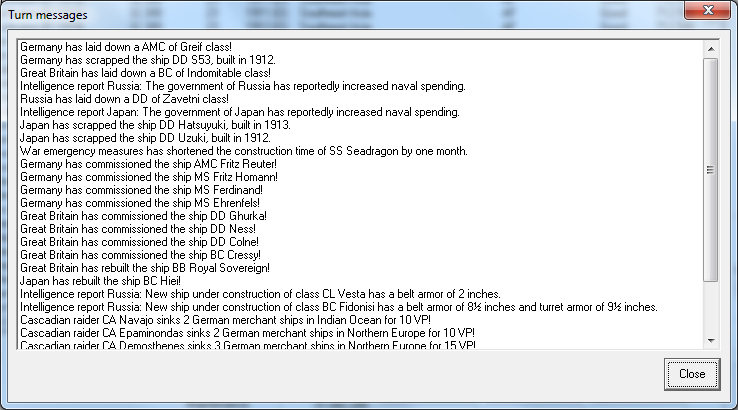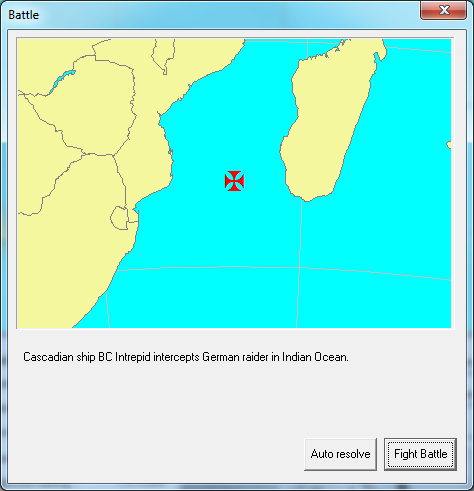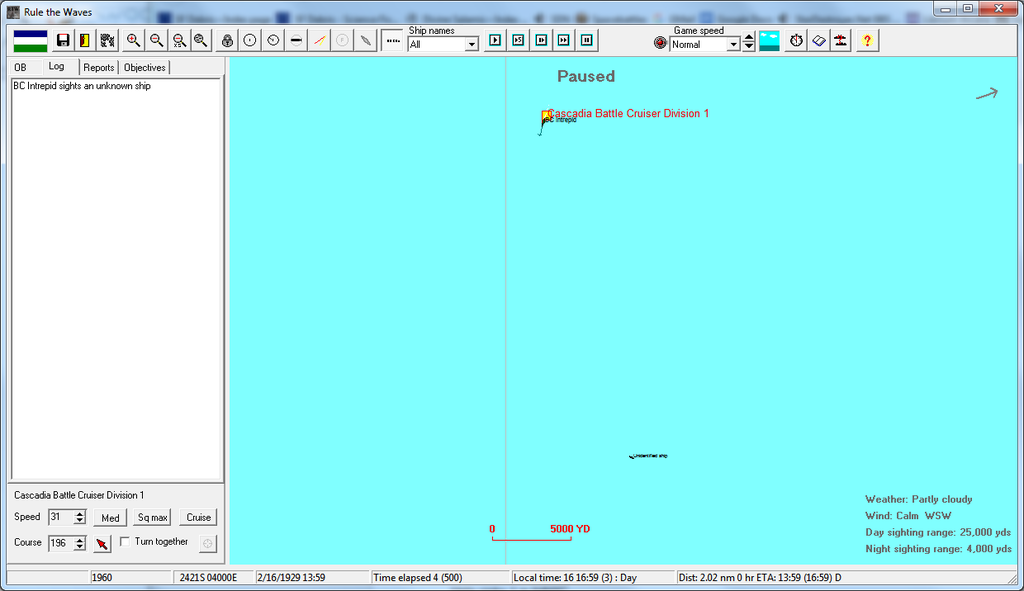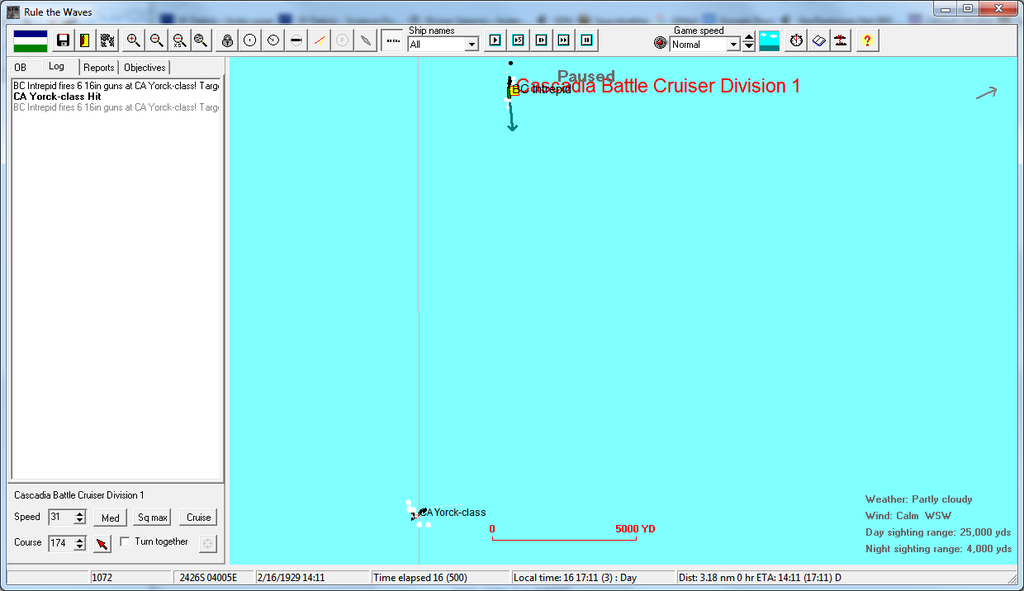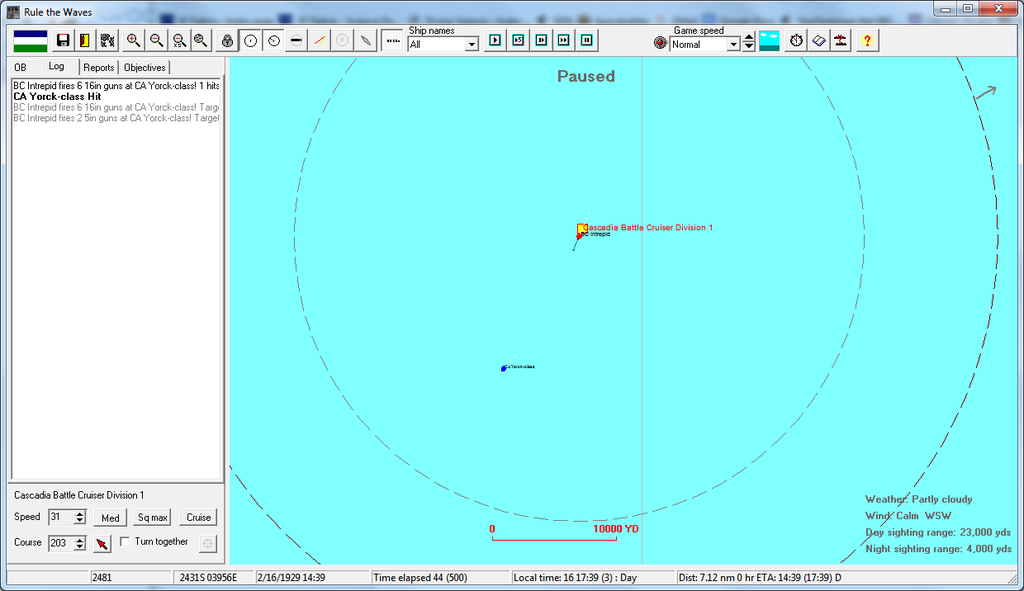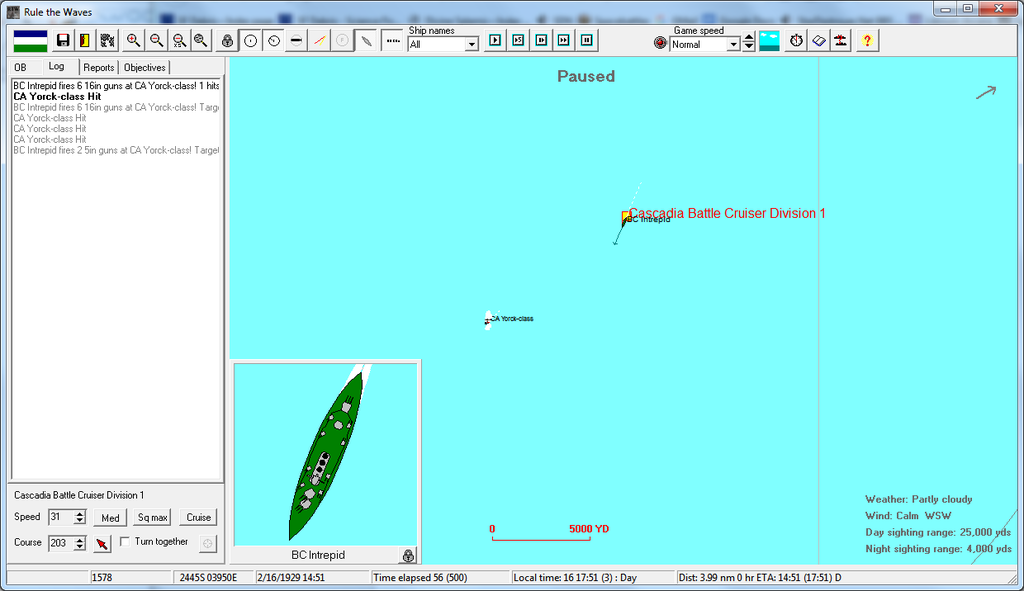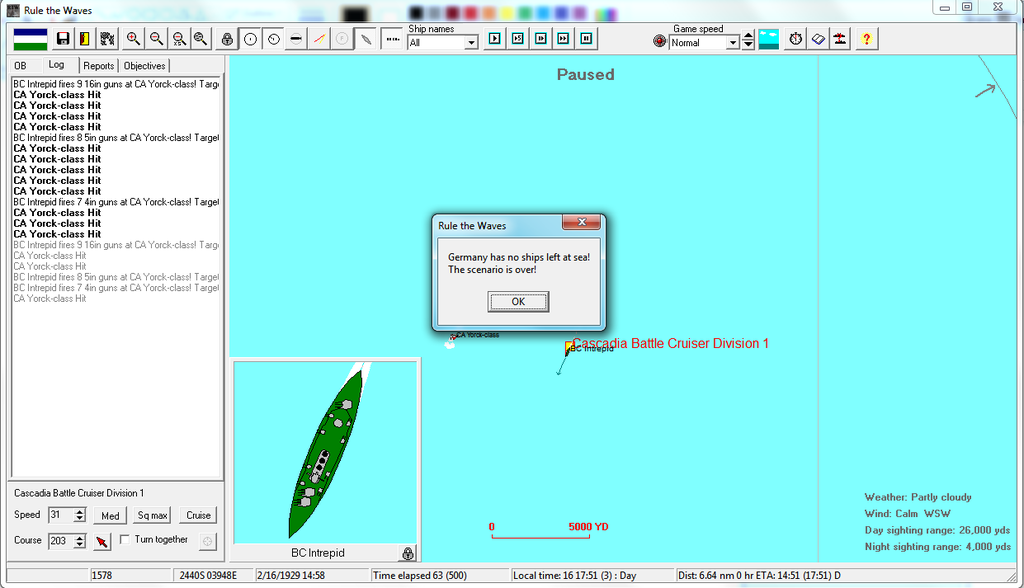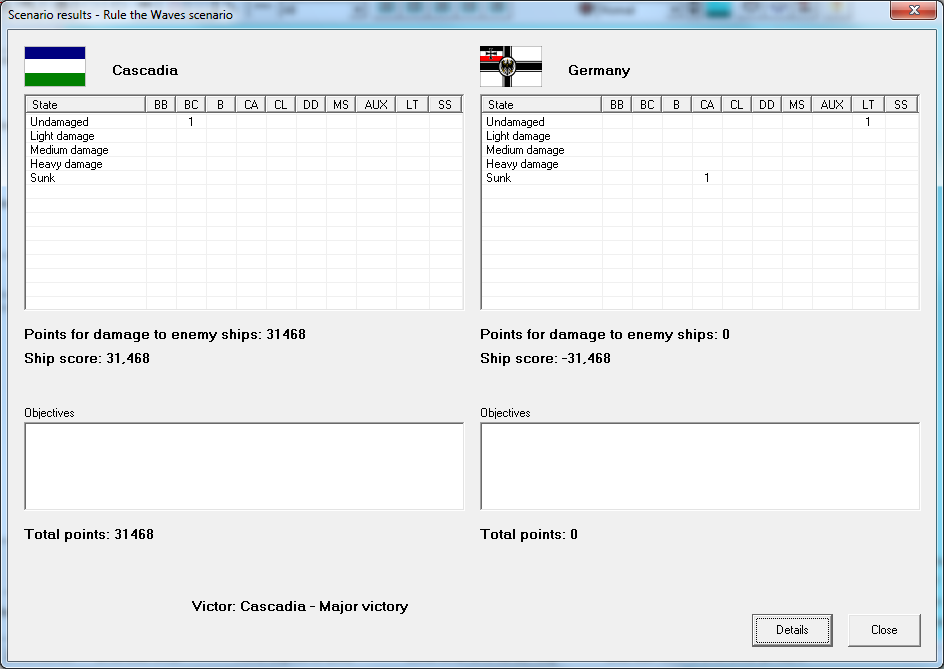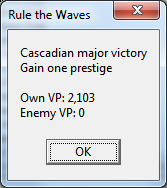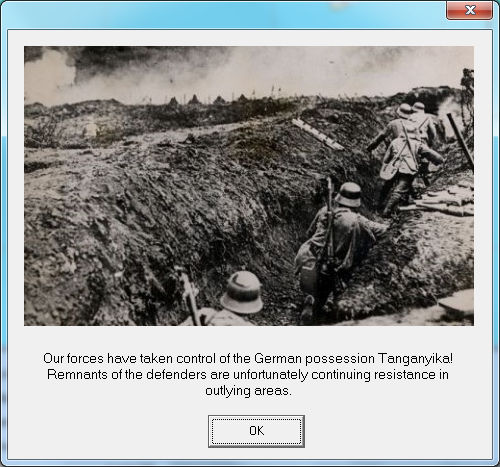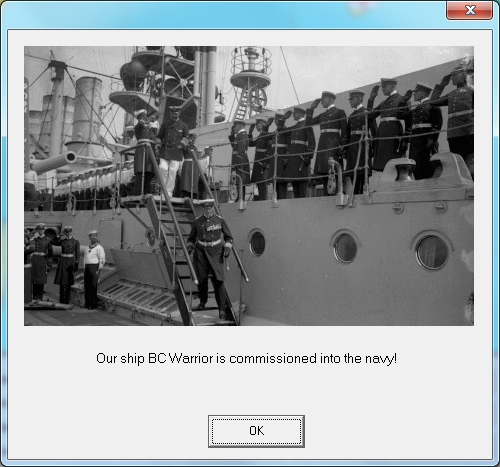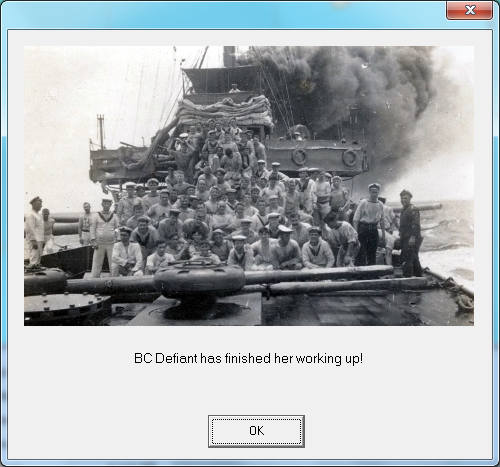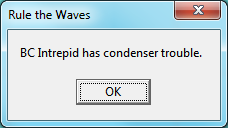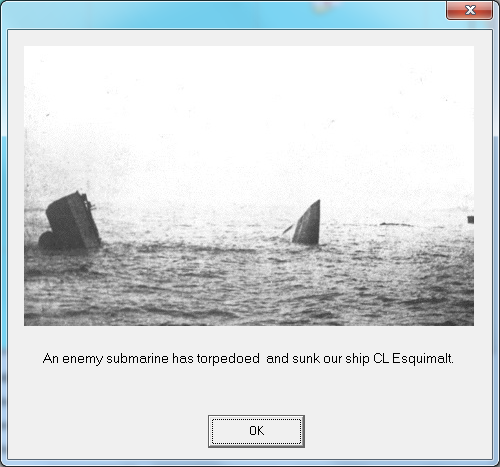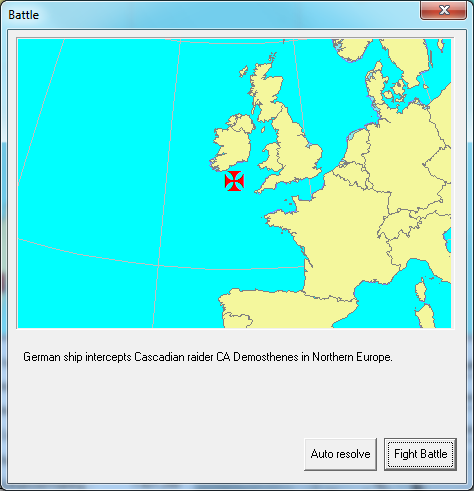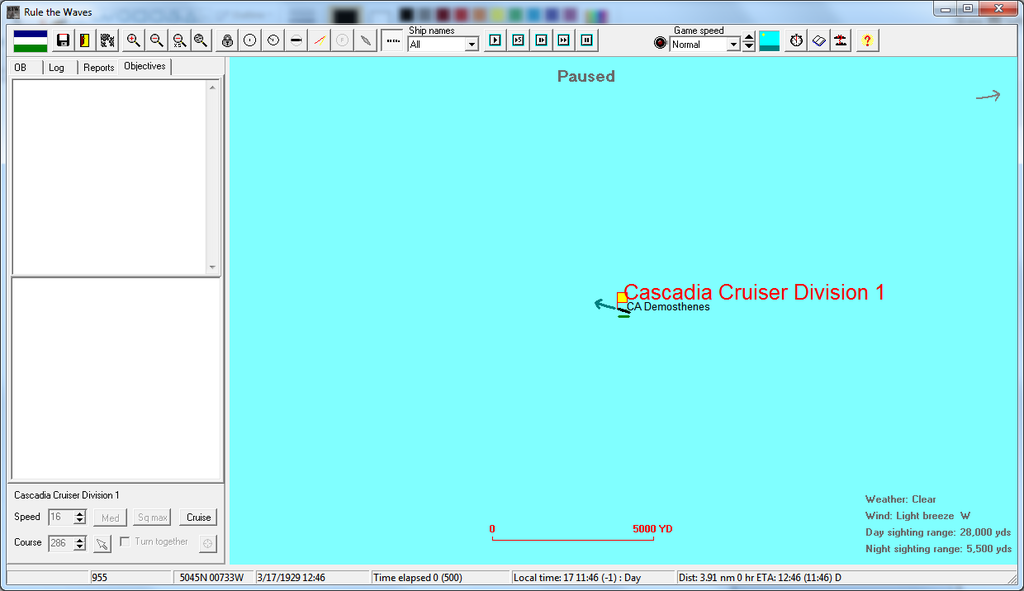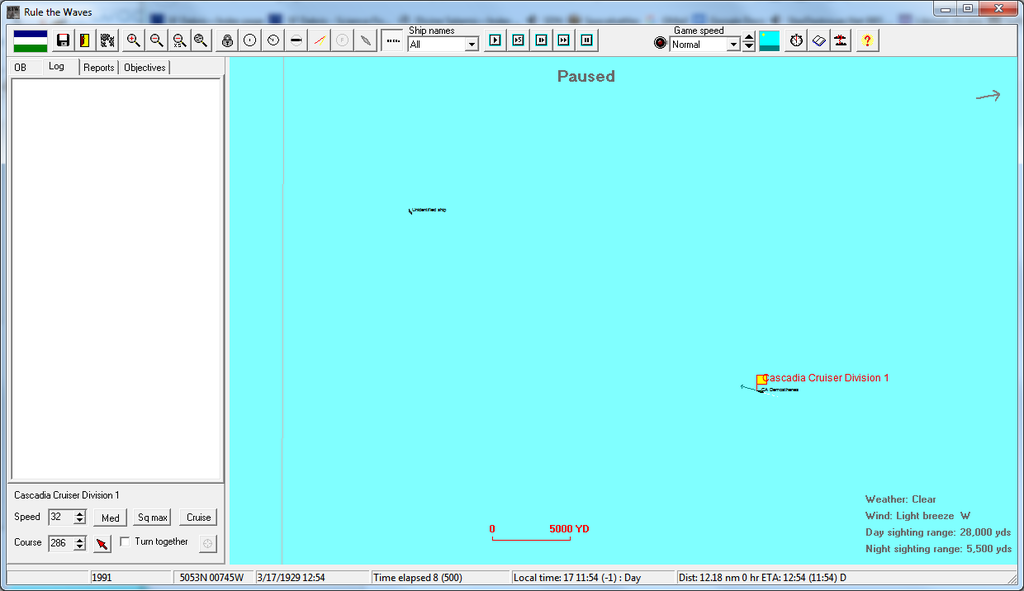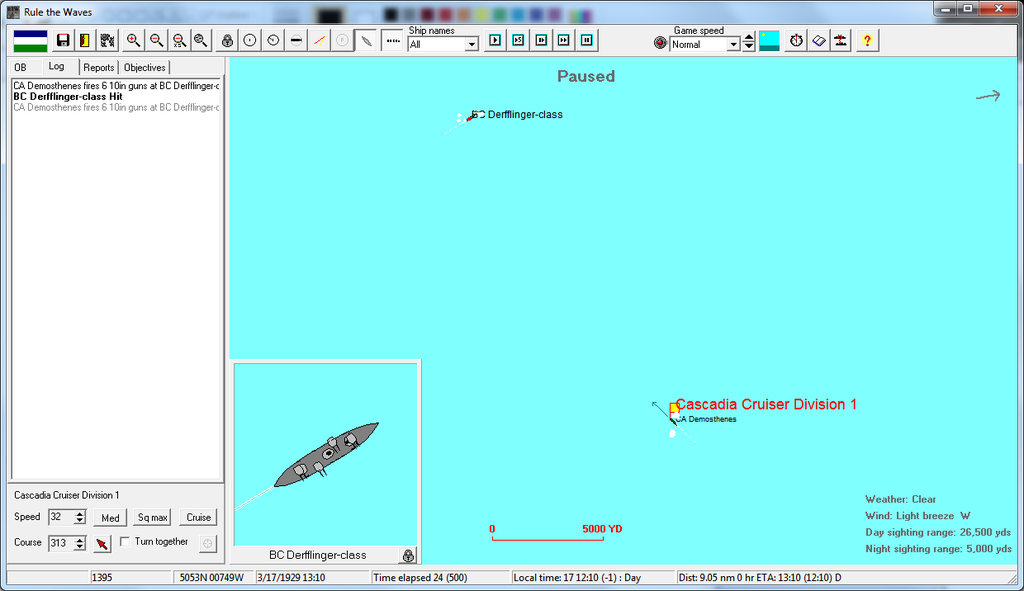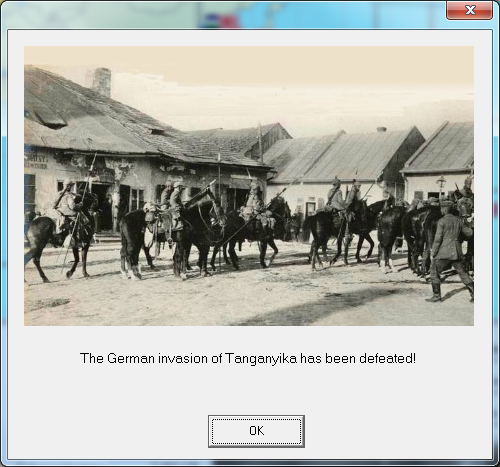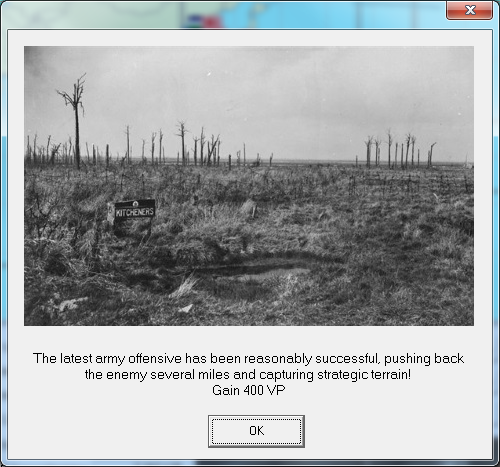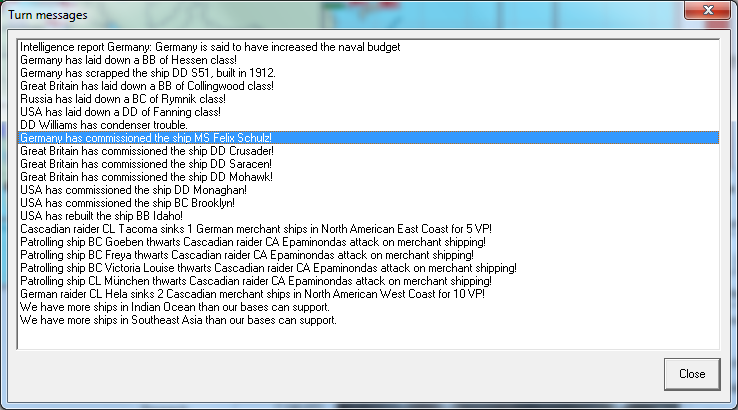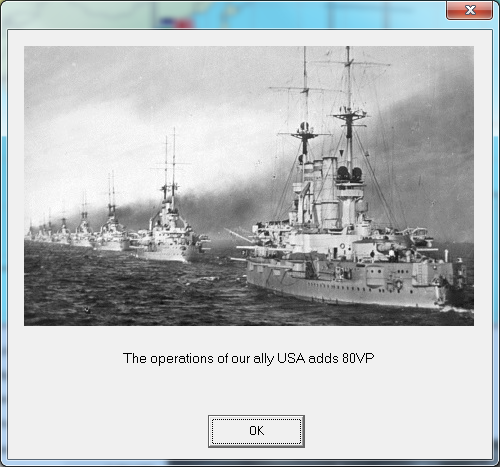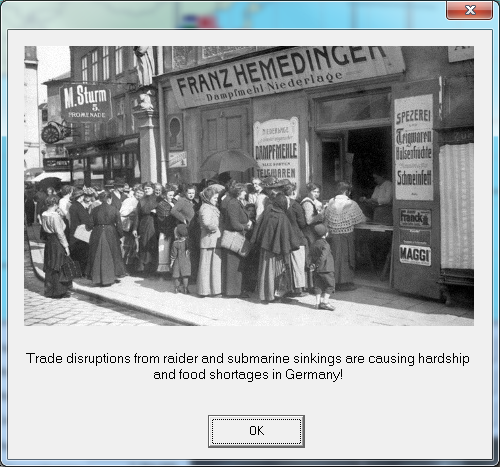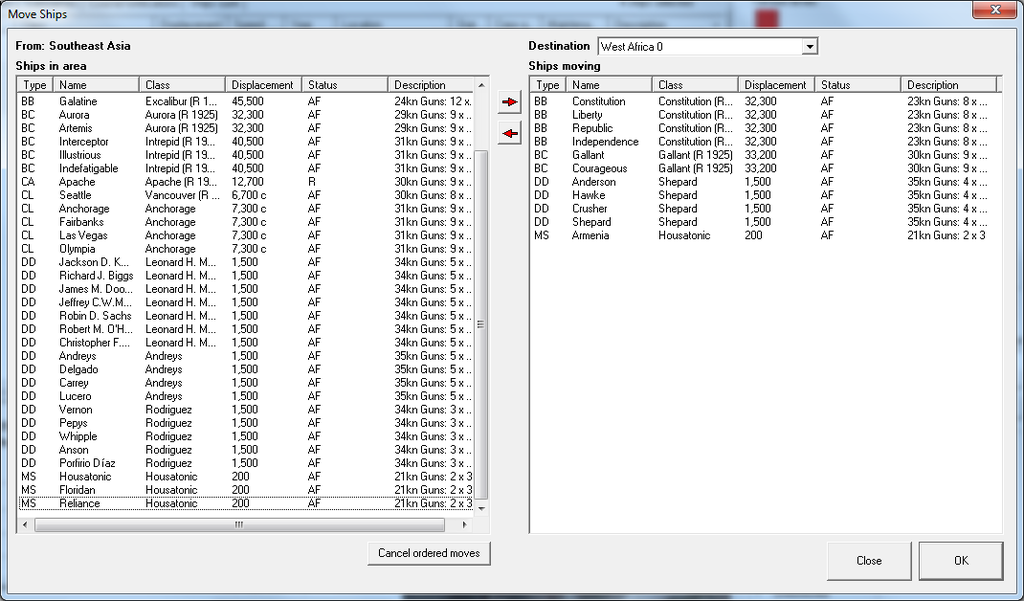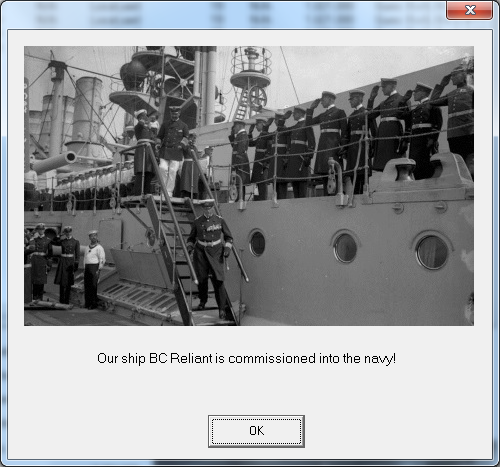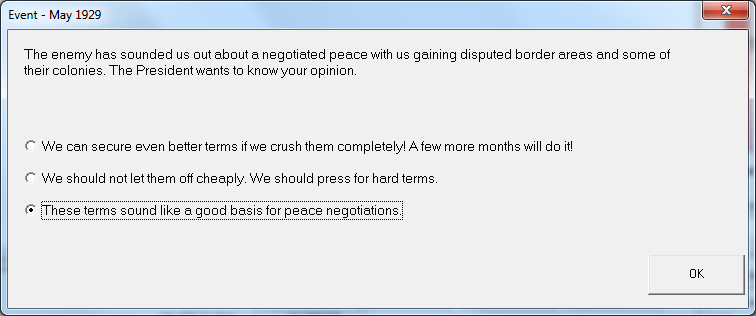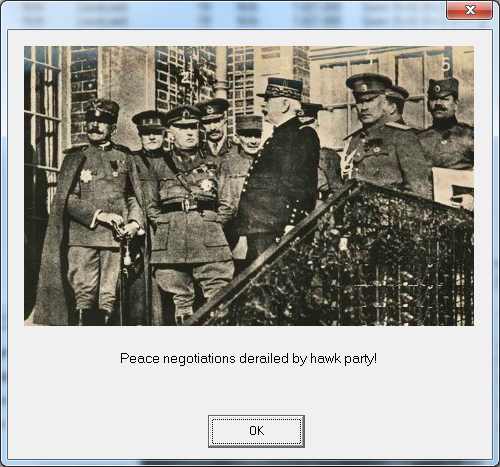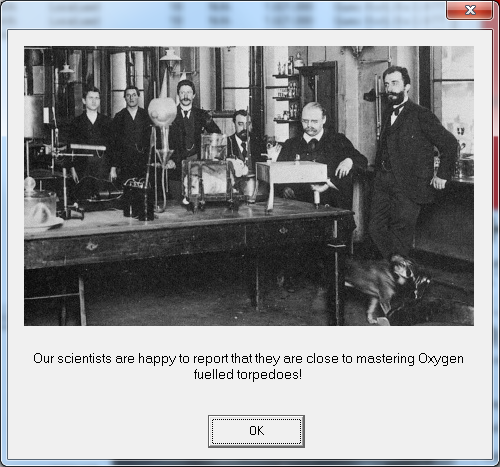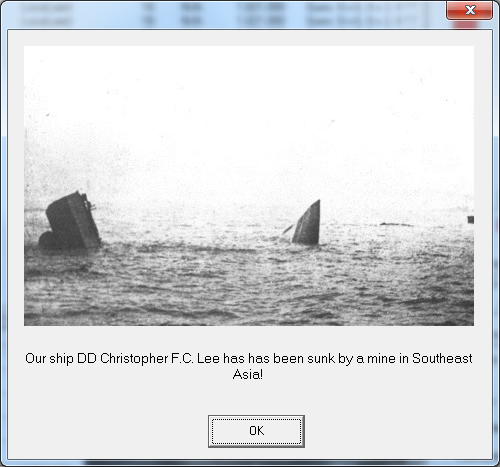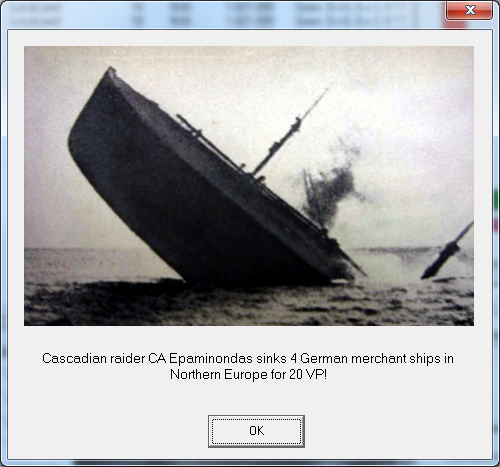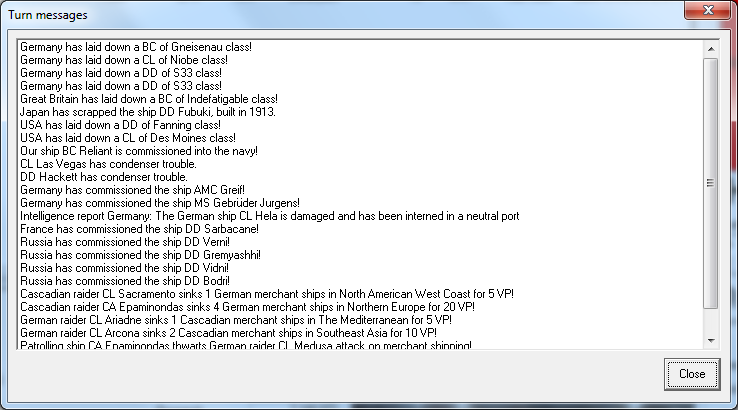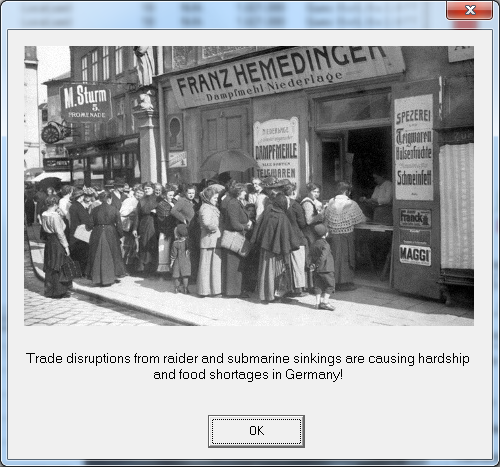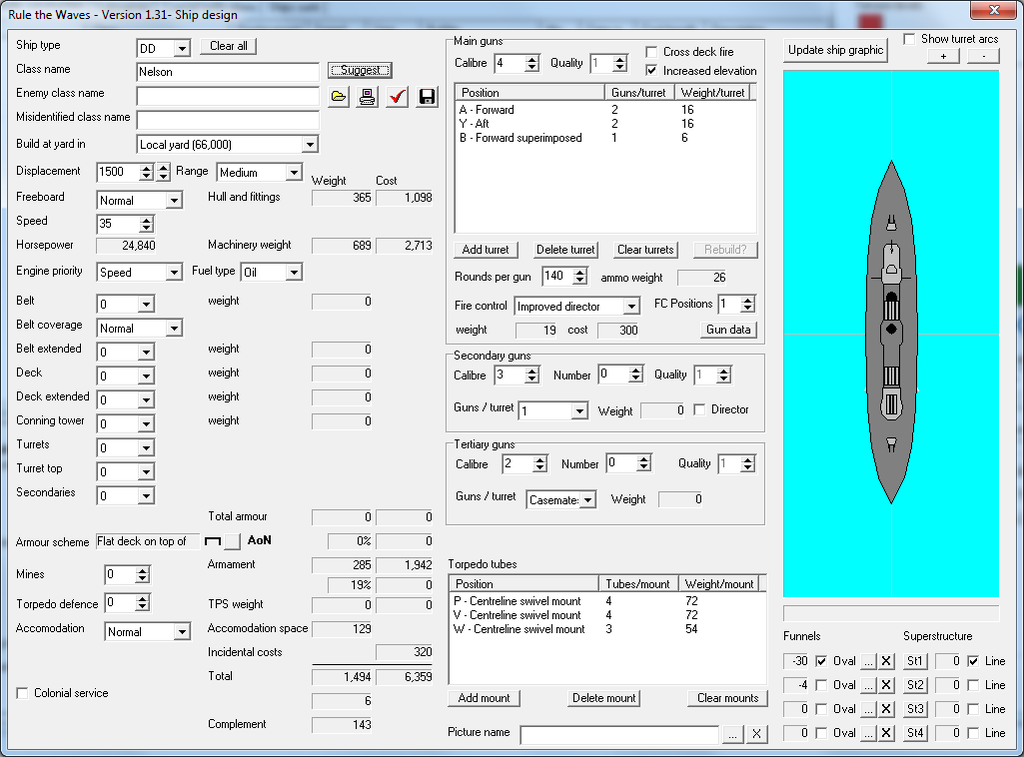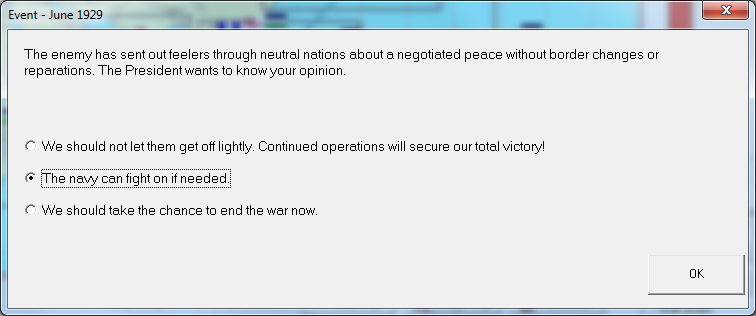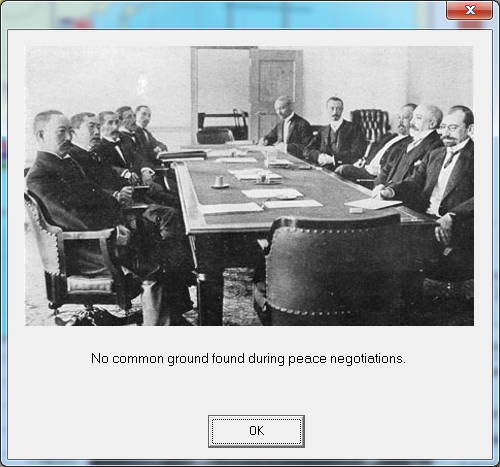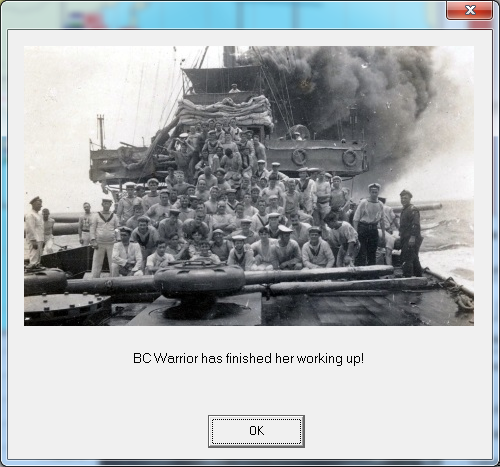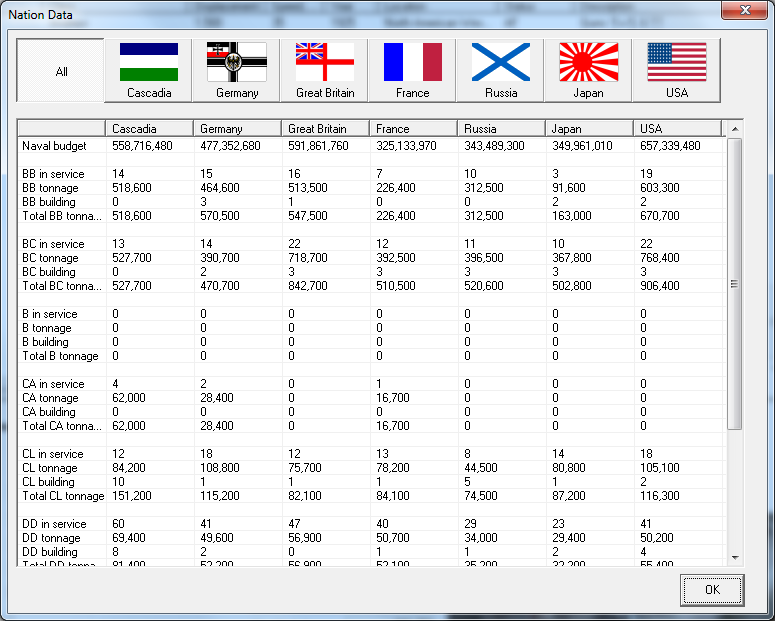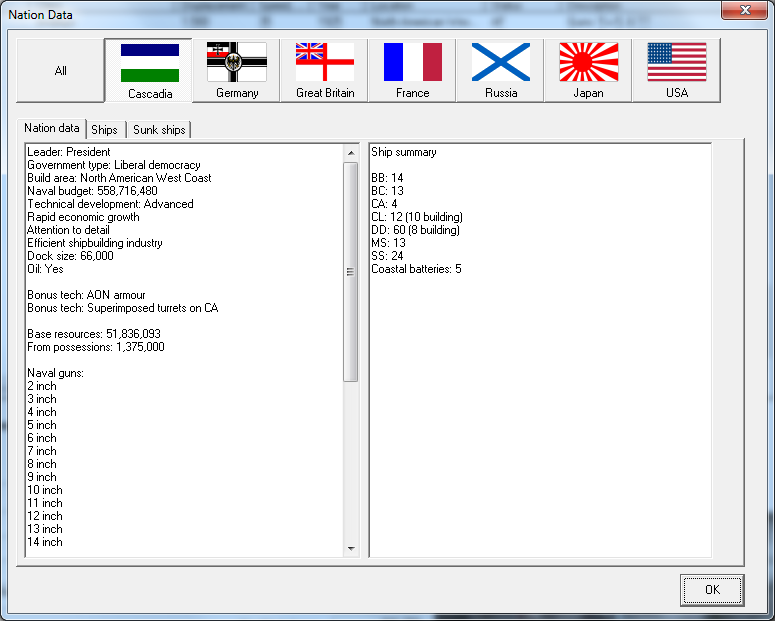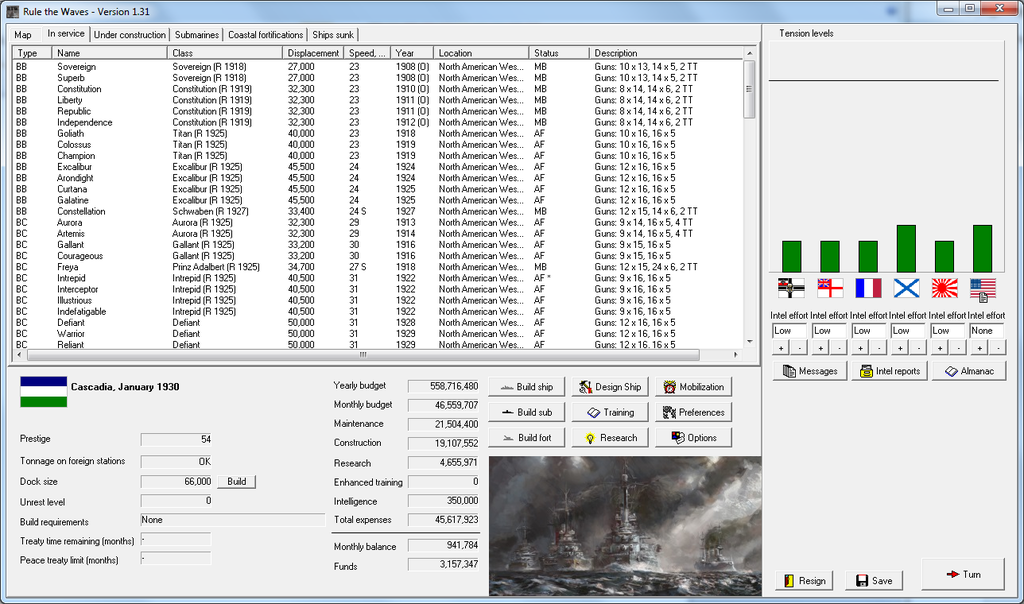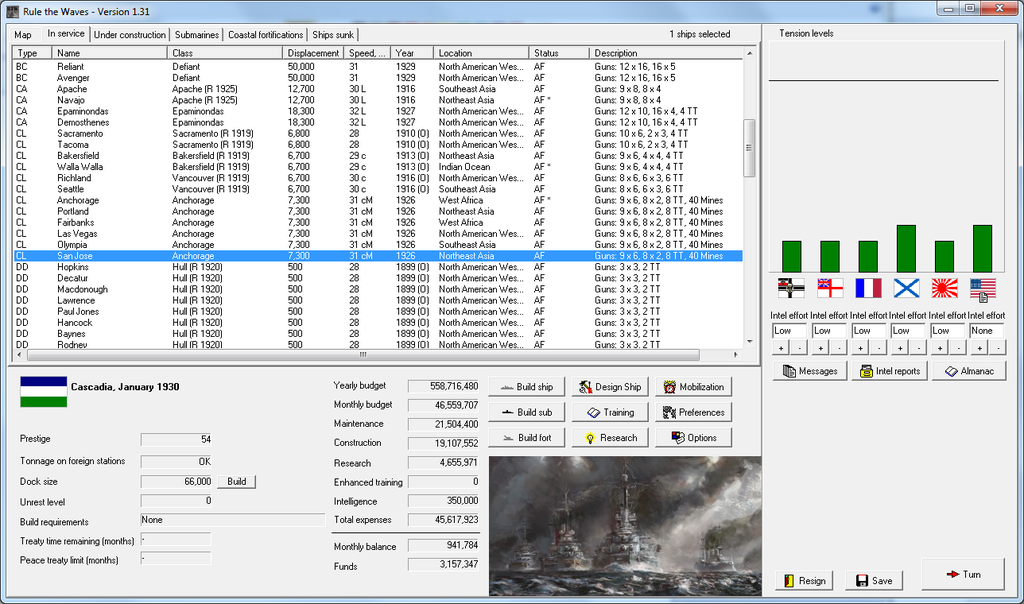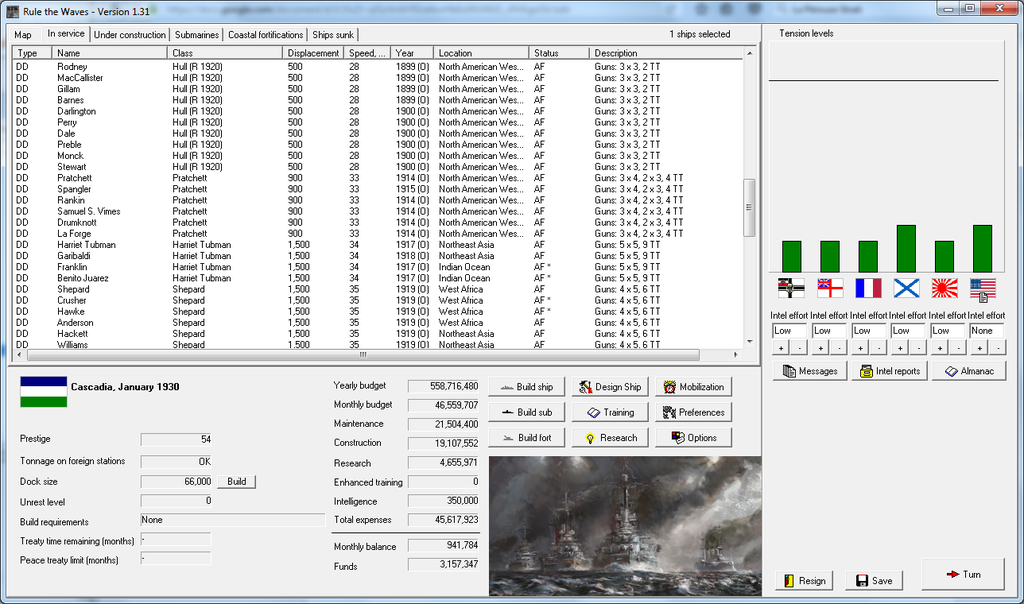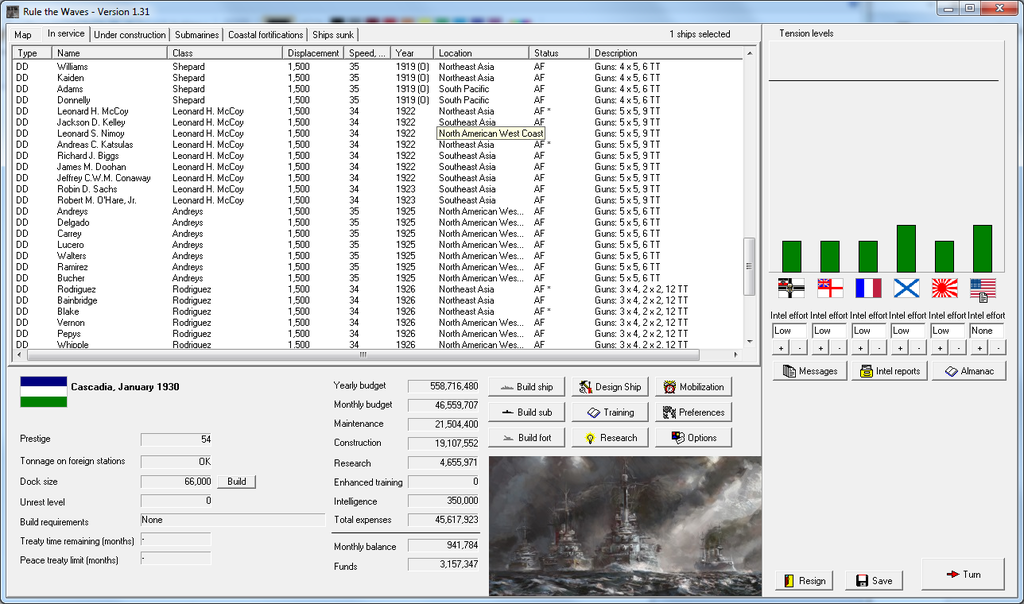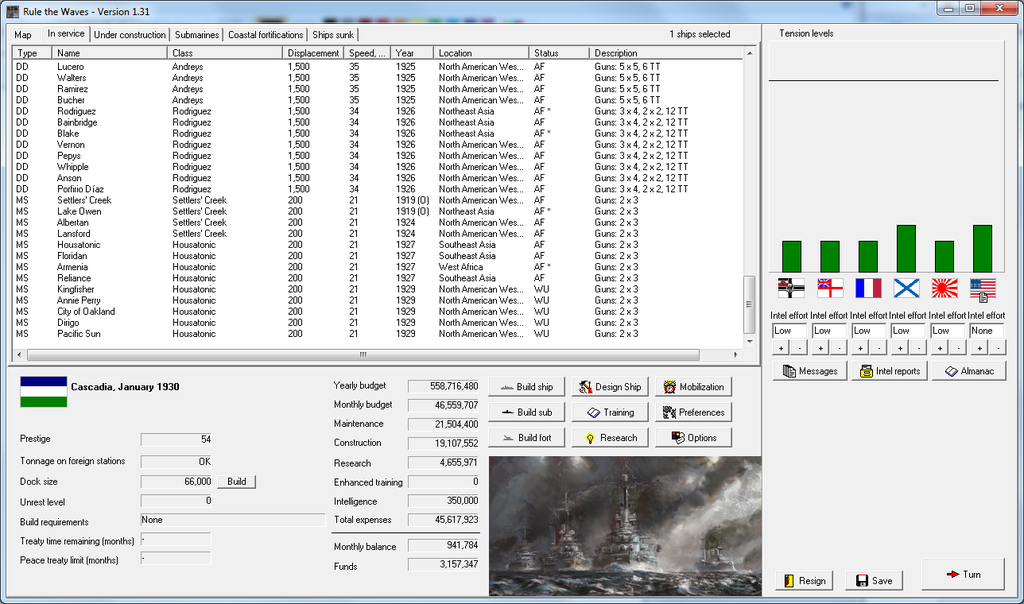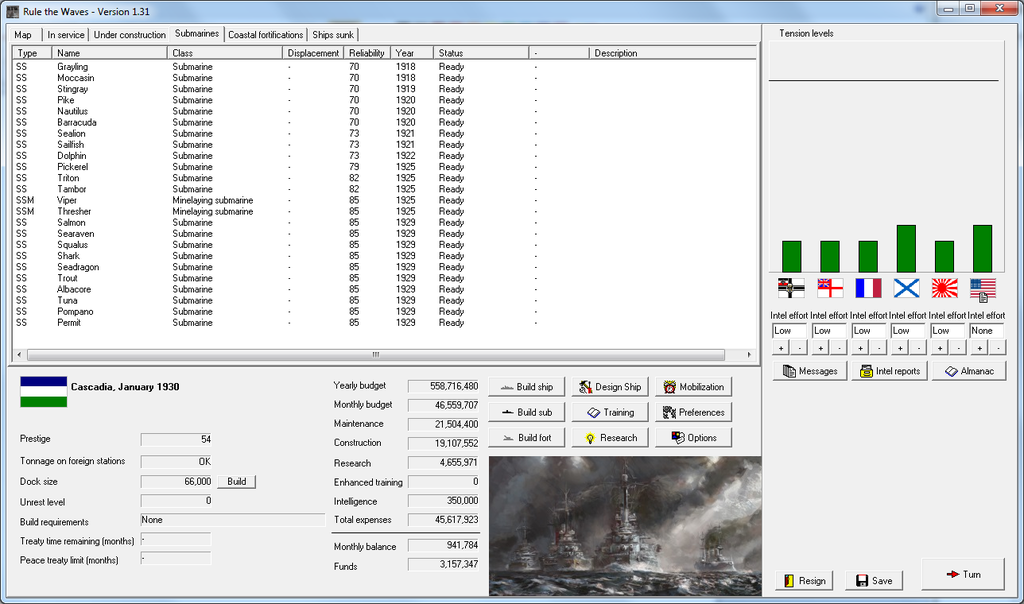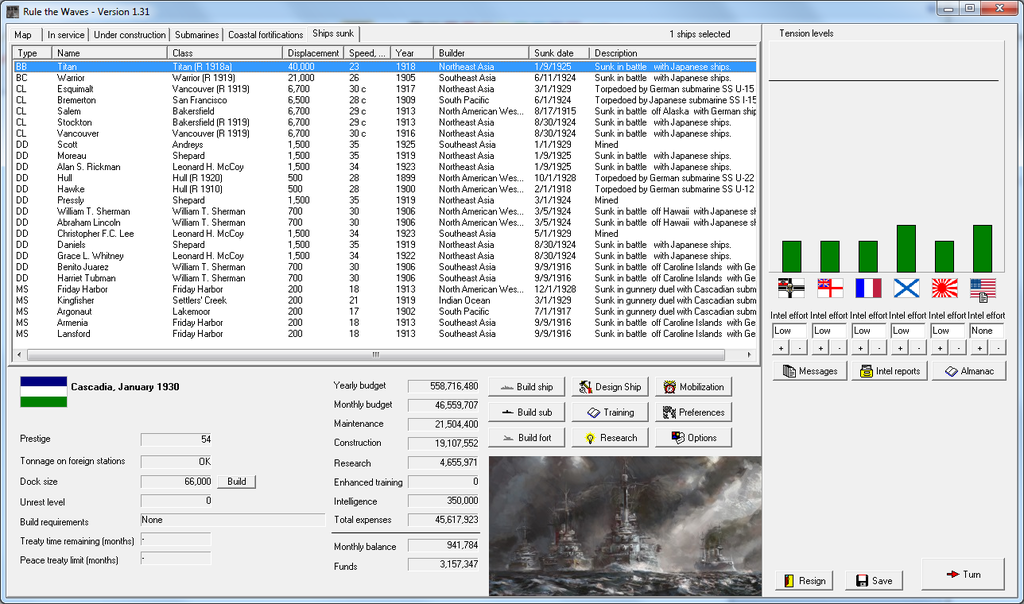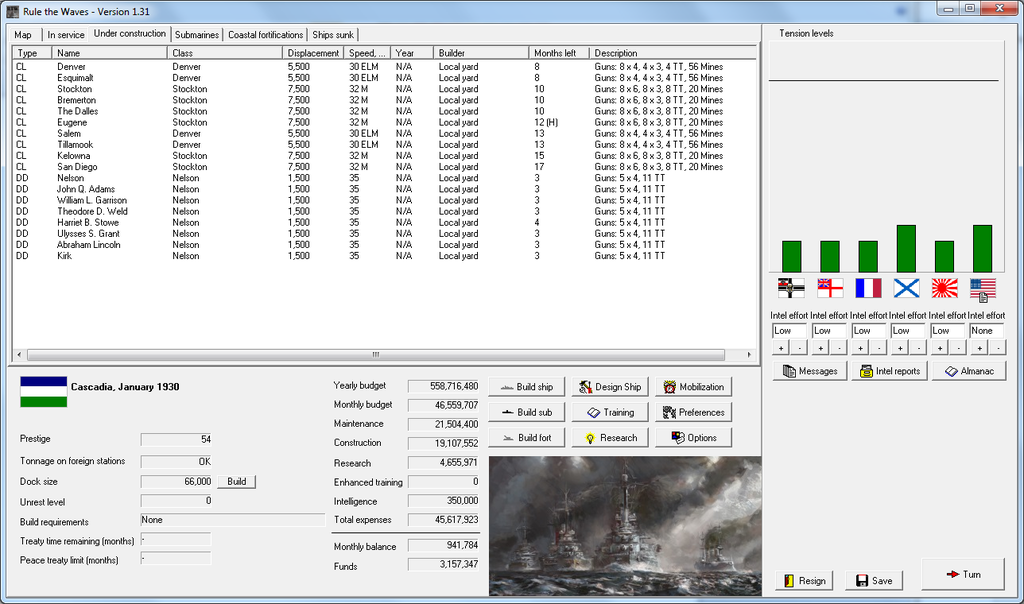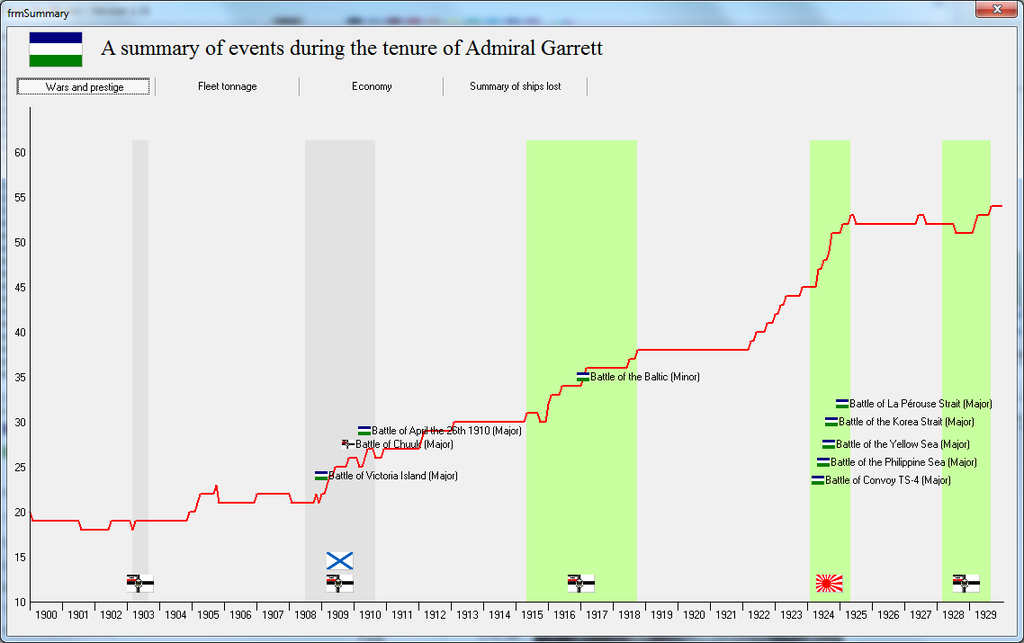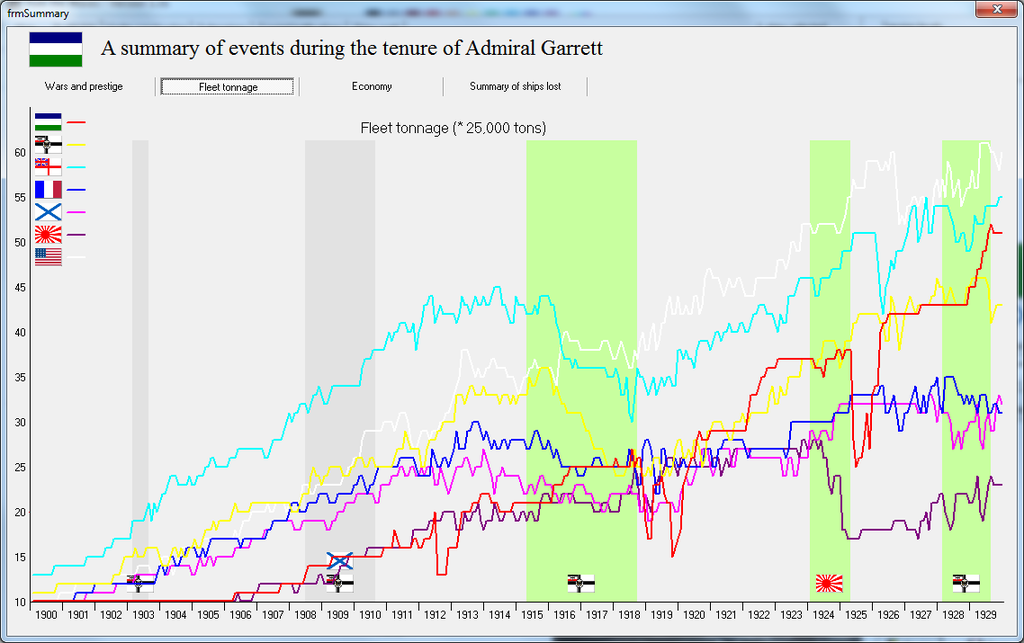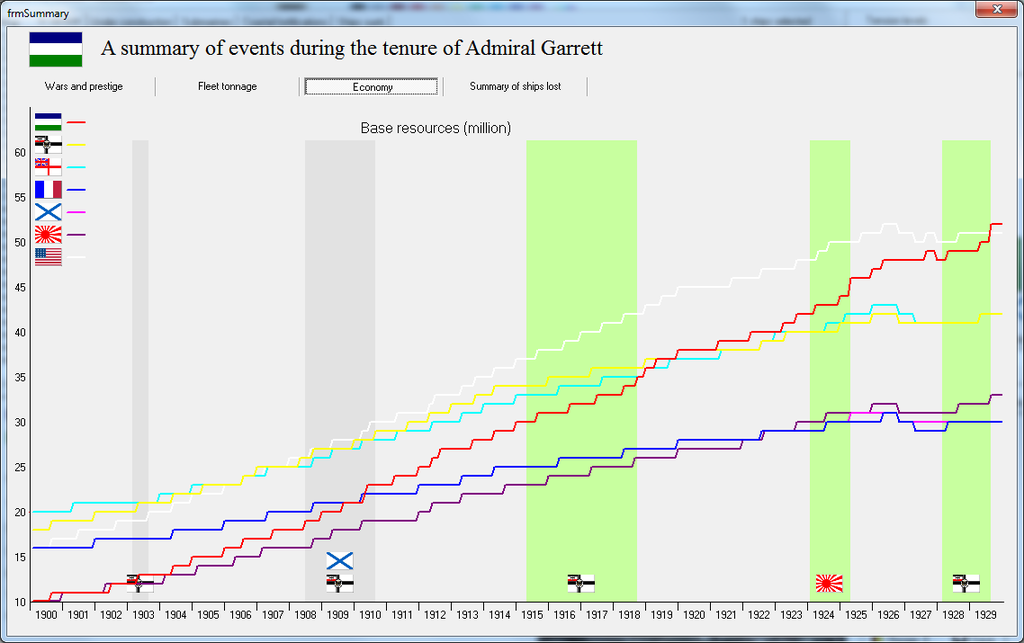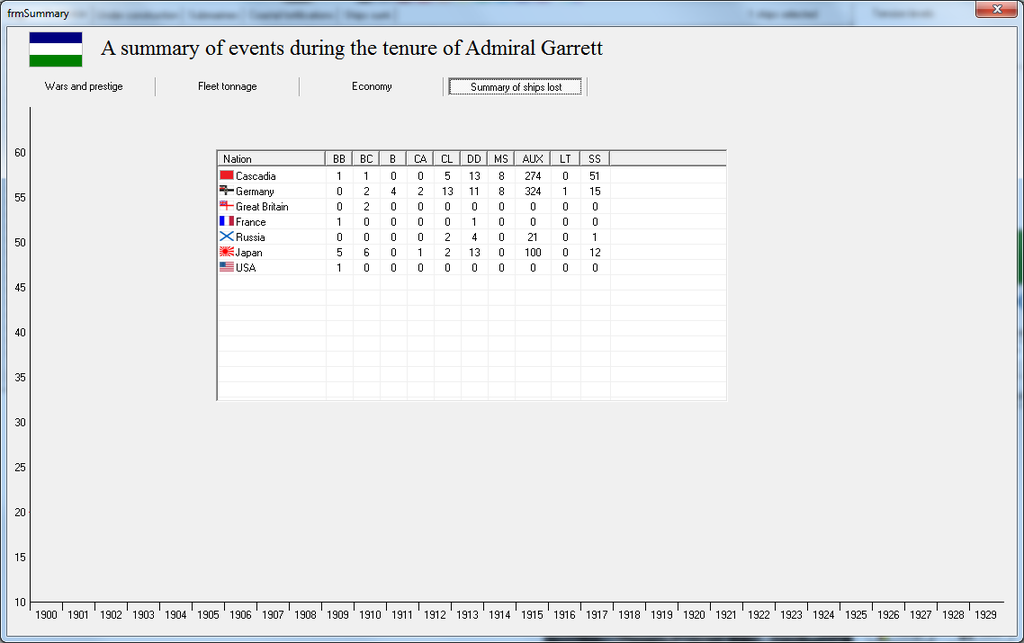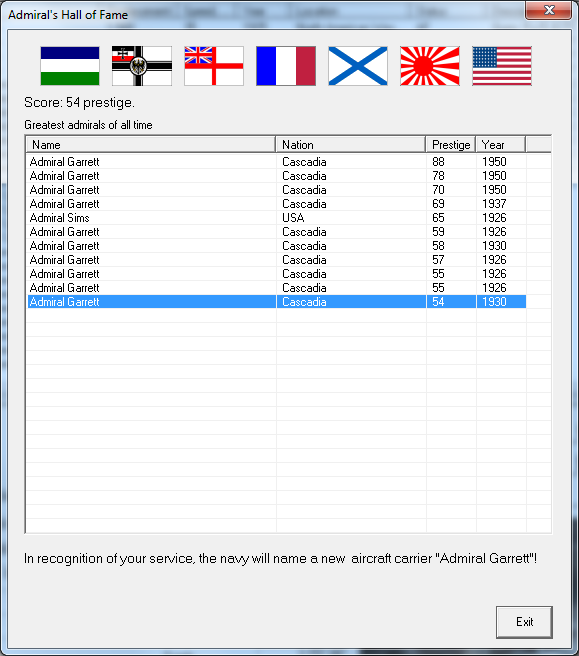July 1929
The
Avenger was commissioned. All four
Defiant-class battlecruisers were now in service and were designated 1st Battle Scout Division - the
Intrepid-class ships were now 2nd Battle Scout Division.
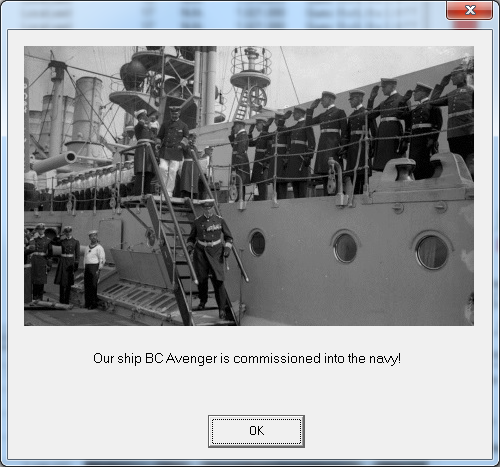
Naval Ordnance confirmed successful testing of oxygen-fueled torpedoes. Production began immediately.
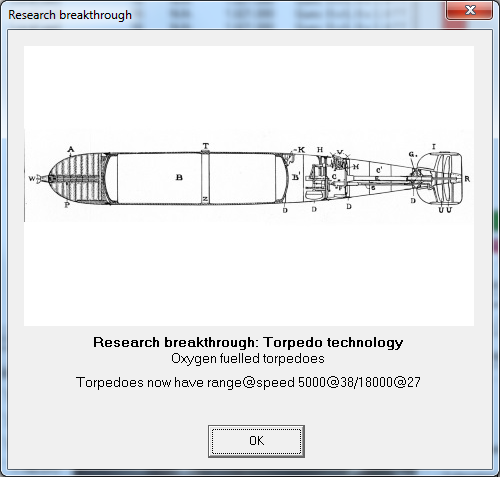
The month's sinkings - four by Cascadian submersibles, three by the
Epaminondas - aggravated the economic disruptions in Germany. The German U-boats only managed 2 sinkings and lost one of their own.
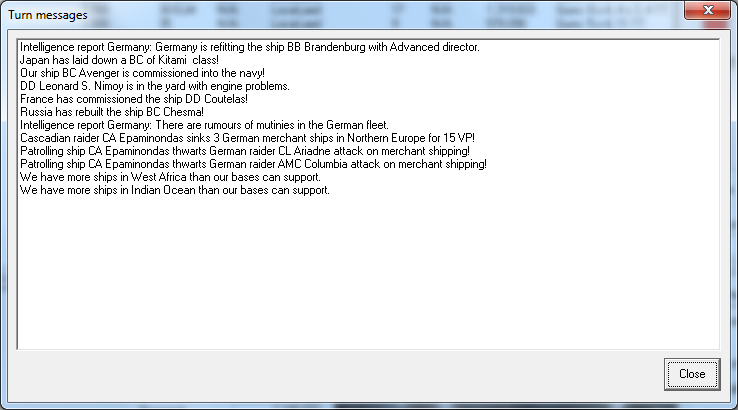
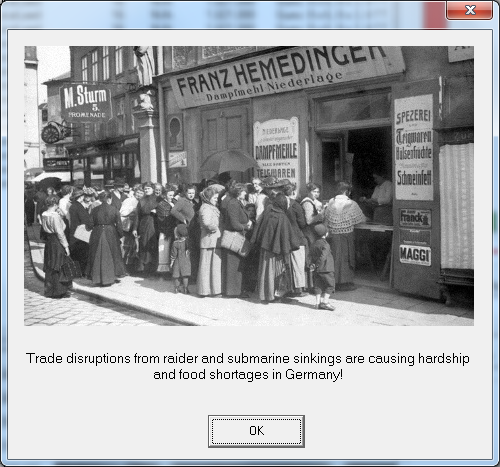
The Cascadian Navy laid two more
Stockton-class cruisers, the
Kelowna and
San Diego, as well as five new minesweepers to replace losses.
A Communist anti-war protest turned into a general strike in Dusseldorf that spread across the Ruhr, threatening to cut of the vital supplies of arms that kept the Republic's army in the field against the
junkers. Communist officials demanded immediate social reforms to be passed by the
Reichstag. The Government called up reserve army units to restore order and take over the factories.
August 1929
Berlin became the site of another uprising by the Communists. Again the Army was called in. But the troops had been suborned by the Communists - they disobeyed their officers and instead marched on the
Reichstag, dispelling the legislature by force and throwing the Chancellor out of office. Factory workers, crying for "pay and bread", hailed the troops and openly cheered Thälmann and Pieck when they arrived to assert control.
Word flashed across Germany by wireless and wire. Thälmann declared the formation of the "German People's Republic" and asserted control over Berlin's civil services. Communist politicians and supporters across the country echoed the takeover, while the forces of the Republic - demoralized and squabbling - failed to assert control outside of some states inside of Germany.
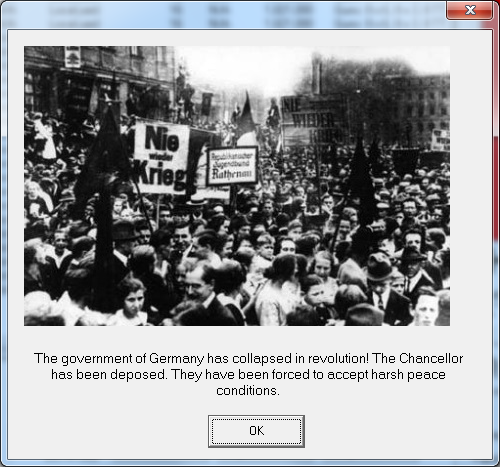
Thälmann and Pieck immediately went to Stalin and asked for his assistance in peace with the North Americans. Stalin's reply was simple: like the Soviets, peace would have to be bought at high cost from the "rapacious capitalists". He urged the leadership to accept demands. Thälmann was worried, however, that doing so would fatally undermine his government. Like the Republic authorities he had overthrown he now faced the vise of an unpopular, unnecessary foreign war and the concessions to end it killing his government.
In the end, his situation pushed him into it. On August 25th a delegation of German Communists led by Hermann Remmele arrived in Paris. They were prepared to meet any terms the Cascadians and Americans gave them.
Abernathy had by now replaced the delegation team with arch-Hawks, led by Populist Representative John Landers of Ogden in Utah. Landers wired to Abernathy that "The German Communists are offering us everything": Abernathy's reply was "Then take it".
It would be more accurate to say that the German government had very little to offer in reparations. Germany was broke. The Germans were still paying reparations from the last war and the rebellion of the
junkers was draining the country's resources. With this discussed, Abernathy's team seized upon their remaining colonies. Germany would sign over Cameroon and Southwest Africa to Cascadia, provide one of its latest battleships as collateral, and in turn the Cascadian government would agree to count the colonies' resource values and tax receipts against the reparations figures in the treaty, temporarily suspend reparation payments from the Treaty of Versailles terms, and assume the costs to Cascadian shippers for the war. The Americans would get what they wanted; no German military sales to South America and reparations for the lost ships to come out of what remained of the surviving German merchant fleet, with the ships to be eligible for return once the reparations had been sufficiently paid.
Thälmann consulted with the Communist Party leadership, the Comintern, and Stalin - at their advice, on August 30th, he agreed to the terms and by doing so liquidated the German overseas empire.
At the start of the century Germany had ruled lands across the seas. The Kaiser's subjects included the tribes of Togo and Cameroon, the Swahili-speaking peoples of Tanganyika, and the Herero and Namaqua peoples of the Southwest. Germany held the formerly-Spanish islands of the Marianas and had taken over the Bismarck Archipelago with the northern coast of New Guinea. The German flag fluttered over the concession in Tsingtao. Even Tsingtao's loss had been made up for with the oil and rubber-rich island of Sumatra.
Now it was all gone.
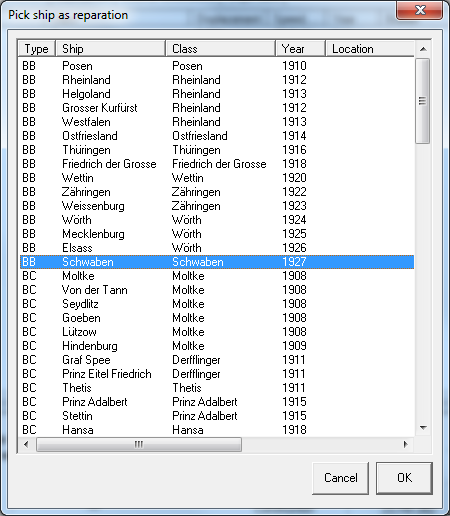
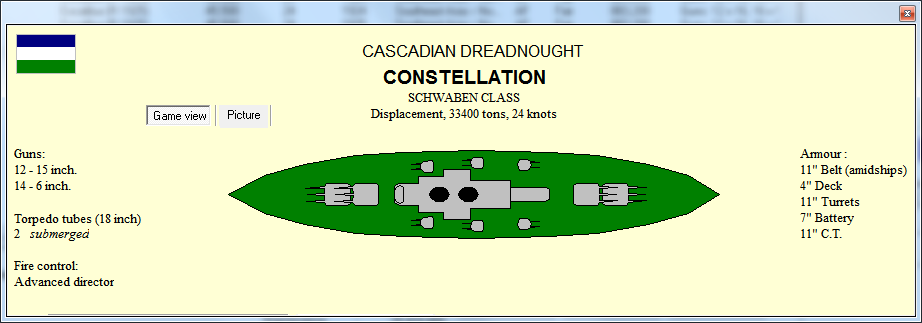
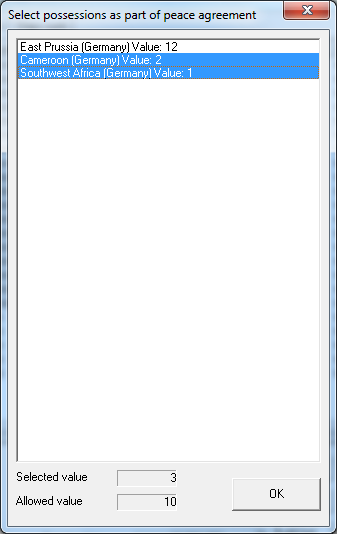
The average German, at the time, had bigger concerns. There was no starvation, yet, but jobs were being lost, the Communist takeover was causing further conflict in the cities and the countryside, and the
junkers finally crossed the Oder during the month, taking part of Frankfurt an der Oder, as well as taking Swinemünde and Stettin. It was patently clear that, peace treaty or no peace treaty, the Communists were losing the civil war as well.
The various ships held in Indian Ocean ports, as well as
Demosthenes in Bristol, were released from internment with the end of hostilities.
The end of the war settled Cascadian relations with the rest of the world for the time being. Britain and France were relieved to finally have Germany removed as a competitor in Africa. Cascadia's new African empire was not the same concern to them - many expected Cascadia to divest said empire soon enough as it was, and even if they didn't, the distances from the Cascadian homeland to their new holdings were enough that they weren't considered the threat that the Germans were.
The US welcomed an end to the war. But an undercurrent of discontent was forming over the end of the conflict - American right to the seas had been confirmed, but the Cascadians' takeover of colonies was a suspicious act to many Americans and widely unpopular (as, indeed, it was in Cascadia). The Germans had other matters to deal with, so relations were allowed to return to some degree of cordiality. The Japanese were also quite peaceful for the moment, perhaps hoping that Cascadian embroilment in African imperial politics might win them European allies.
The Soviets were still cordial, but the Comintern made it clear how Communists felt about the "grasping, murderous, thieving capitalists of Portland". Abernathy was derided as "
Herr Kaiser Abernathy" and often depicted as a lookalike of the Kaiser as a means of propaganda.
Post-war tensions - Britain and France at 1, Germany Japan and US at 2, Russia at 3
The
Reliant finished working up.
The Navy ended its enhanced training program to save costs in the post-war budget. The Battle Fleet was recalled to home waters.


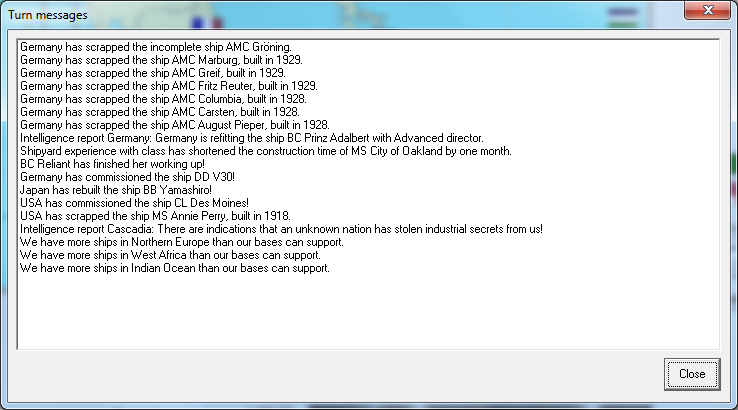 The Admiralty
The Admiralty
Portland Federal District
30 August 1929
The news had come in by wire: the German Communist Republic had signed the agreement. Cascadia and America had won. The German Empire was dead.
Admiral Garrett took the news with quiet introspection when Wallace delivered the note to him. "To think I would see the day," he mumbled. His eyes gazed to one of his maps. The islands of Samoa were prominent there, including the Cascadian-controlled base at Apia. "I remember when we were afraid the Germans would seize Samoa from us. When Cascadian diplomacy was marshalled entirely to ensure that the Germans could not. And now look at us." He turned his face to another new map, a world map, showing the territorial holdings of the world's great powers. He could make out Cameroon and German Southwest Africa, not to mention Tanganyika. All of those lands would now fly the Evergreen Tricolor. "My mind rebels against it, Phillip. We have an African empire.
We, the Cascadian Republic, a Pacific power, now govern the destinies of many thousands, millions, of Africans."
"It seems unnatural, I agree," replied Wallace. "Perhaps we should have spoken out…"
The Admiral raised a finger. "No. It is not the place of the Navy to meddle so deeply in national affairs. We advise and then we obey. I will not have us end up like the Army, constantly dabbling in Conservative and Liberal politicking."
Wallace could have pointed out that in four months that would be
his call, not the retiring Admiral Garrett's.
"Of course, sir," replied Wallace, in the place of such a reminder. He sighed. "Four months, then?"
"Four months. Are you ready?"
"I am," Wallace assured him.
"Good. Old Admiral Wilburn, God rest his soul, did not get to hand authority over to me like that."
"I remember." Wilburn, the Chief of Naval Operations who had first made the Admiral a part of the Admiralty as Chief of Naval Design and Procurement, had died at the Naval Academy in Esquimalt in 1906, elevating Admiral Garrett to the rank that he had held for over 23 years. "If I may, sir… what are your plans when you retire?"
The Admiral was quiet for a sad, lonely moment. "I will leave Portland," he finally said. "Back after the second war with Germany I had a house built in Astoria for when I retired. It was for my wife and I to spent the summers in." His eyes glazed over slightly. Tears shined in them. "It is down by the Columbia River at Youngs Bay, not far from the main port. It is not anything like Vallejo Estate, of course, but it has a few spare rooms for the grandchildren to visit and a room for my library and study." A small, sad smile came to his face. "Maybe great-grandchildren if I live a few more years."
"Are you sure about it?", asked Wallace. "It was for you and her, and now…"
"...it'll be just me, yes," the Admiral answered. "For a few years, at least. My sons have homes available already so I intend to give it to Sophie, if she desires it." A distant look appeared in his eye. "Or, depending on matters, maybe Gabbie."
Wallace said nothing. Over the years, the rumors about Gabriela Garrett and Isabela Talaverda had become impossible to avoid. "Even if her…
friend is still with her?"
There was no mistaking the pain that came over the old man's face. The war within him between the part of him aghast at what his daughter had become… and the part that, regardless of that, still loved her. "Perhaps," he admitted.
There was nothing more to be said on the matter. Wallace instead reached for a bottle of Californian wine he had brought with him. "A toast, sir?"
Normally the Admiral wasn't one for wine in his office. But having just turned 77 a week prior, he sighed and nodded. Wallace poured the two glasses and handed one to the Admiral. "To the end of another damned war, may this be the last," he proposed.
"It is the last," replied the Admiral. "My last, anyway." He frowned at the random thought in his head. The thought that, for Wallace, Japan and Germany might yet provide another war for him to deal with. But he said nothing on the matter. "To the end of the war," he said, raising his glass in a toast.
Wallace did the same. "And to the Cascadian Navy, may God keep our seas calm and our skies clear."
"Amen, Phillip. Amen."
September 1929
While the German Civil War continued to rage in that country, Cascadia assumed formal control of the former German holdings in Africa. Cascadian Marines were landed at Duala, Luderitz, and Swakopmund to take over from evacuating German regulars. Admiral Rawlings issued a proclamation guaranteeing the civil rights of German settlers and native peoples. In Southwest Africa this immediately set him at odds with the white settlers, who had enjoyed superiority since the failed Herero rising of 1904-1907.
It was this rising that also came up in the Senate, and which Abernathy used to argue against now-Democratic Senator Gerald Adkins' charge to refuse to ratify the Paris Accord. Abernathy asserted that the only way to protect the surviving natives in the Southwest was to assert Cascadian law upon the German settlers. To refuse the peace treaty, even if a ceasefire were upheld, would continue the suffering of these peoples. As a maneuver it came off as cynical given Abernathy's behaviors, especially since his own home province of Montana had a poor reputation of working with native populations.
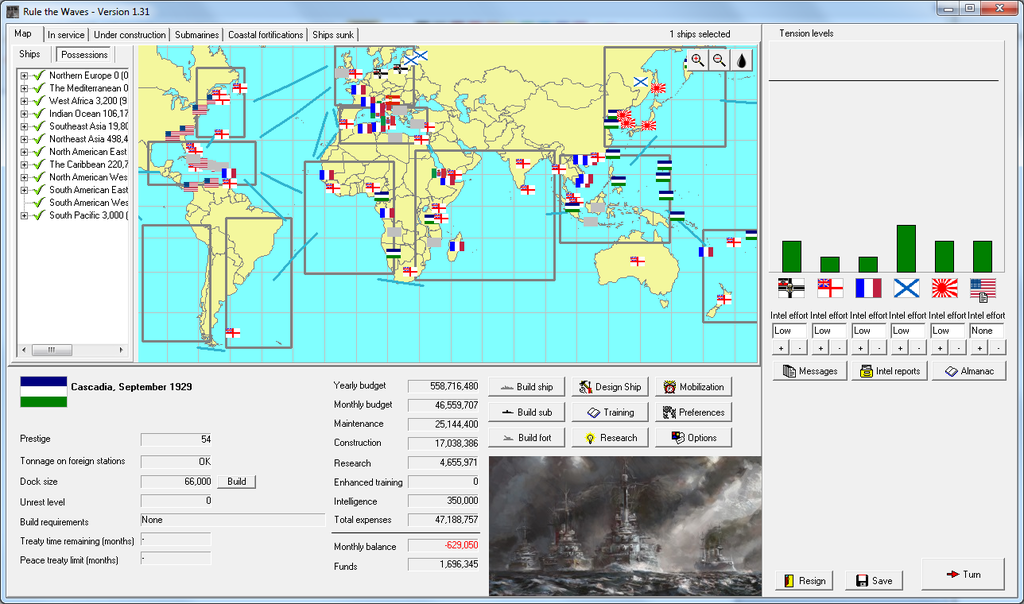
Ultimately the Senate, defying some expectations, ratified the Paris Accord on September 10th, a week shy of the upcoming elections.
Abernathy's hope was that an end to the war and the gains to Cascadia would win his coalition a majority.
His hope proved false.
It may have dampened the swing somewhat, but in the end, the Hawk Coalition was swept from power. The Democrats and, surprisingly, the Socialists were the big winners - the Democrats gained a near-majority in the House and the moribund Socialists rose to fourth in seats. The Populists fell to just a dozen seats, all in their interior homebases, and the Conservatives declined to a distant third, with just four more seats than the recovering Socialists. The Liberals managed to be second and to just barely deny the Democrats a ruling majority in the House.
Senator Karl Green, now the leader of the Democrats in Parliament, was preparing a minority government. The Socialists were radicalizing and the Liberals, as an organization, were still Abernathy's group.
But Green found a surprising Coalition partner: Jake Roberts. The aging Populist knew his days in Portland were numbered. An investigation into corruption was costing him pull in Montana and would likely cost him his legislator-appointed Senate seat. His Party's drubbing was amplified by the fact that most of the new Populists were isolationist and anti-imperialists who opposed the conflict. Indeed, if there were anything that separated Populists from Democrats, it was that the former were firmly a rural party dominated by white and predominately white settlers of the inland provinces along the American borders, prone to racist bigotry and pro-white nativism.
That proved the stickler, as the Populists wanted to amend the Native Rights Act and Native Nations Protection Act to reduce the size of the Native Tribes' national homelands. Roberts proposed only a slight modification that would secure Populist (and likely Liberal) support in the vote in exchange for Populist support for the rest of Green's proposed social legislation and, most importantly, a military budget cut. Green, however, would not compromise on the issue - he would offer increased government programs and support for interior farmers, but he would not compel the native tribes to permit more land clearance through a reorganization of a federal act. In disgust Roberts quit the deliberations, much to the discomfort of younger Populists who were willing to compromise. But for the time being Roberts' authority in the Populist Party leadership made it impossible for younger Populists to displace him.
Abernathy, meanwhile, considered trying to form his own minority government with the Conservatives and Populists. But here he ran into a problem: Muniz had already called for him to resign and, when pressed, declared he would not accept any government run by Abernathy or someone linked to him. In the press their partisans started slinging ferocious amounts of mud - Muniz was accused of abusing the Presidency's powers for partisanship, Abernathy of resisting the democratic will of the Cascadian people, who had clearly voted against his Hawk Coalition.
Economic news started to come into focus: British markets were declining due to finding of fraud that led to several jailed investors, including known investor Clarence Hatry. The German Civil War was also having an effect upon European markets as Germany, once an importer of goods from various countries, was no longer buying: Danubia, Italy, and France all had clear economic troubles. Danubia's problems were being escalated by rumors that the elderly Franz Ferdinand was about to name his son Maximilian his heir, in direct defiance of the agreement he made when he married his late wife Countess Sophie Chotek.
The submersibles
Salmon,
Seadragon,
Albacore, and
Permit were commissioned.
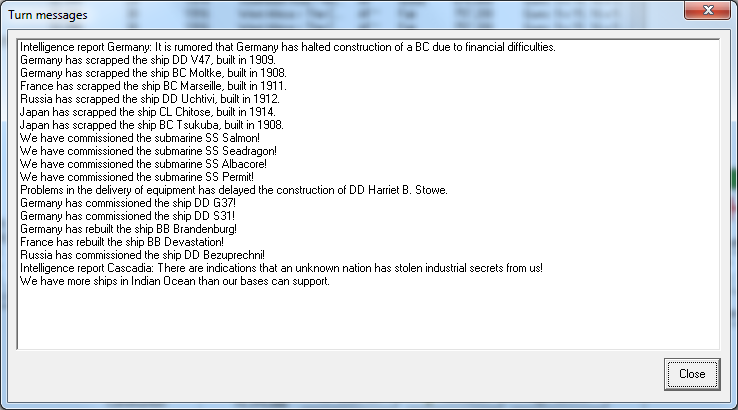
After consultations with Admiral Wallace, Admiral Darrin Rutherford as Chief of Naval Design and Procurement, and other officials, Admiral Garrett ordered the scrapping of the
Ranger and
Reprisal. The two battlecruisers were over twenty years old, were hopelessly outdated, and a rebuild to make them relevant as coastal guards or convoy escorts was deemed too expensive. The ships were ordered to the breakers, although Wallace and Garrett agreed that as the sister of the old
Warrior the
Ranger would be temporarily held back from scrapping while independent organizations attempted to raise funds to convert her into a museum ship.
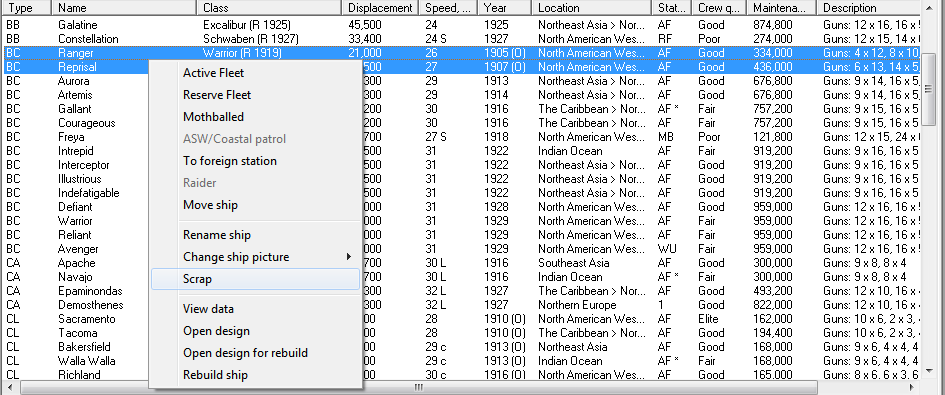
News of the treaty also provoked a anti-Communist uprising in Bavaria where a political sausage of monarchists, republic-aligned conservatives, and Hitler's Nazis took to the streets. Hitler and his forces seized Nuremburg independently of the others, who secured Munich. Kustrin fell to the Prussian revolt. By the end of the month Hannover was also up in arms, driving out Communist officials sent to begin enforcing the new property laws. When some in Hannover openly contemplated the idea of Hannover leaving the German Empire and becoming a sovereign state, it caused panic among Germans opposed to a disunion of the German nation.
Stalin proposed to Pilsudski that if he permitted Soviet troops transit rights to attack the
junkers, the German Communists would turn over Polish-populated areas of SIlesia and Posen to Polish rule. Pilsudski was indeed interested in territorial gains, but he didn't trust Stalin and the negotiations went nowhere.
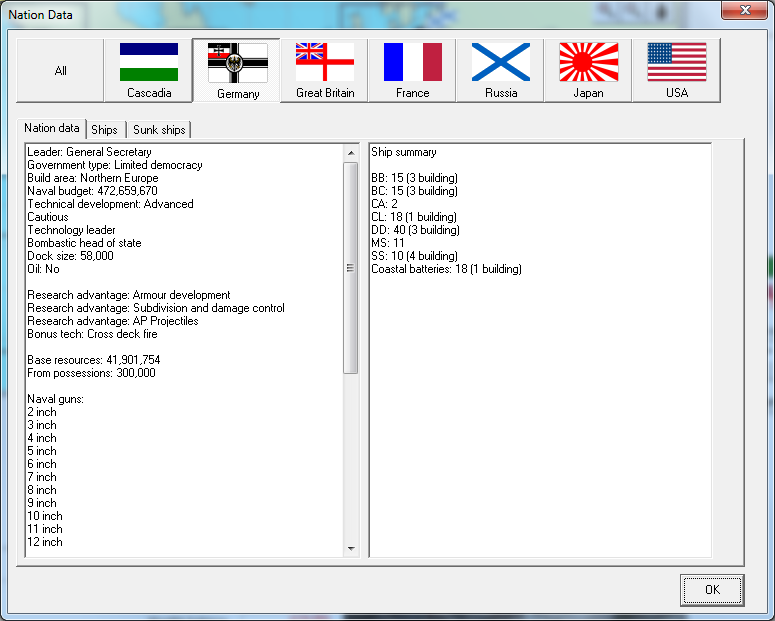 October 1929
October 1929
Six more submersibles joined the depleted sub fleet of the Cascadian Navy:
Searaven,
Squalus,
Shark,
Trout,
Tuna,
Pompano.
The
Avenger finished her working up period and joined 1st Battle Scout Division.
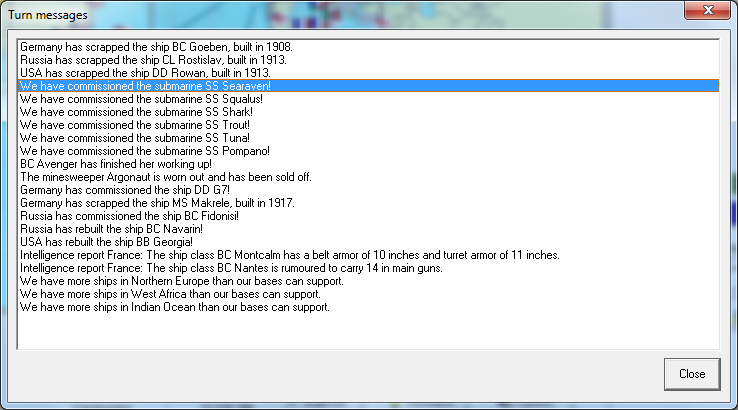
With no end in sight for the political deadlock, Muniz was ready to call for new elections. He stopped only when a group of Liberal Senators in the Senate asked for more time - on October 19th it was announced that Senator Green was indeed assembling a Cabinet that would include Liberal Senator Emiliano Santiago as Foreign Secretary and Liberal Representative Frederick Woolsey as Secretary of the Treasury. Representative Thomas Garrett of Vallejo was named Solicitor-General, but it was widely recognized that he would be Santiago's likely replacement if the Democrats controlled a Cabinet reshuffle.
When the new Parliament met on October 21st, Abernathy - as a Senator - immediately moved for a vote of no confidence against Green's Democrat-dominated Government. Representative Cromley did the same in the opening session of the House. At Abernathy's instruction the Whip was applied in both Houses - any Liberal who voted for the minority government would be stripped of his party support.
This time, the maneuver backfired. Woolsey had submitted in 1928, but now he held firm - Santiago did too. Half of the House's Populists defied the Populist Whip and voted with the Green Government. Green's Government, still technically a minority government, survived.
The Garrett House
Portland, West Oregon
21 October 1929
It had been a long Monday for Thomas when he arrived at the old family house. Anne-Marie had insisted, and his father had as well. He met them in the parlor and sighed as he took his seat. "Today has been eventful."
"Did Abernathy topple Green's new Government?", the Admiral asked.
"No." Thomas sighed. "No, we got enough Liberal defectors to resist their whip and vote for the Government. And a few from the Populists too. That's a surprise. I suppose even the Populists had to show some sign of acknowledging the country west of the mountains."
The Admiral smirked slightly at that. "Yes, I suppose. I take it that means you will soon be spending your days at the Legal Office?"
"Yes it does." Thomas nodded. He looked at his father with his lone eye and closed it in circumspection. "And you'll be gone, I suppose?"
"Oh, come now. Astoria is only a few hours by boat. Even less if you take an automobile up the new highway."
"True. Perhaps we can spend weekends once a month or so." Thomas shook his head. "But you're going to be alone out there. And with your health I… well, I thought you might do better going to the Estate."
"The Estate is your home, Thomas. For me, it was always your mother's home. My family rebuilt itself in Astoria and, in many ways, it was my home." A slight grin came to his face. "And your cousins and their children still live in the area."
"Richard owns the family shop now, right..."
"And his son is looking to get into Esquimalt. Just as your cousin Jesse did." The Admiral smiled thinly. "Although I will be 'Grand Uncle' and not 'Grandpa', I suspect I may have some little ones around from time to time."
"At your age, Pa…"
"I'm only 77," the old man guffawed. "Remember how long your Grandpa Jim lasted."
"I do." A concerned look was on Thomas' face. "He was 79."
Thinking of his father, dead now for thirty years, was another older pain, dulled by time… and by Rachel's death. The Admiral drew in a sigh. "I will watch my health, Thomas. I would like to see my great-grandchildren."
Thomas chuckled. "Me, a grandfather. Now I'm feeling old."
"You are going to be 40 next month," the Admiral reminded him. "And you should be minding your health too. But that is not what I wish to discuss with you. Before Ms. Freeman brings dinner out and John gets back with the other children, I need to ask you and Anne-Marie about the family house."
"As in this one?", Thomas asked.
"Yes." The Admiral reached down beside his chair into a briefcase. "I consulted with my personal attorney on the matter, and with the Navy attorneys…" He came back up with a stack of papers. "Here."
Thomas took them and read them over. He blinked. "A trust?"
"Yes. You are the legal scholar of the family, Tom, so it's best if you take the lead in this."
"I see." He continued looking over the paperwork. The terms… did not surprise him. His father was always kind like that. "I suppose it will work. Perhaps beyond our lifetimes there may be trouble if the Navy or the National Government change their minds on some of the aspects."
"I suspect that may not be an issue for a long time. But I want to make sure everyone is cared for."
"Yes, well… yes, I think this will work. You still have Mister Lewis as your attorney? Adrian Lewis of Lewis McMartin & Morgan?"
"Yes, I do."
"I'll sign this and get an appointment with him… when I can." Thomas sighed. It was one more load of work for him… but it was one he would take without question. "Even when you're gone, I'll make sure this works for you."
"Thank you, Tom," the old man replied. "Now, let us head to the dining room. If I know Ms. Freeman, dinner should be…" A distant bell rang. "...ready for us now."
The timing brought chuckling from the assembled family members. Within seconds the signed papers were packed back up, and all were heading for dinner.
On October 29th, a stock market scare rattled investment bankers - the San Francisco Stock Exchange reported a four percent fall in value.
November 1929
Fighting in Germany continued to attract world attention, as did a new stock market slide, this one in France. The British and Danubian governments - with Franz Ferdinand personally involved with the latter - urged the German factions to make a ceasefire and accept mediation for a new political settlement in Germany. The pleas fell on deaf ears.
Meanwhile the Green Government went to work. Saddled with the former German colonies, it passed, in succession and with varying Liberal and Populist support, the Tanganyikan Organization Act, the Cameroon Organization Act, and the Namibia Organization Act, which renamed the German Southwest Africa colony to reflect the name of the large coastal desert of the country. A letter in the
Portland Tribune from a former consul in Walvis Bay stating that "Namib" was a Nama word for "vast place" gave the new name additional traction, although many German settlers would defiantly continue to refer to "
Südwestafrika" as their homeland.
The Acts allowed for a period of up to twenty years during which the three colonies would be governed as semi-autonomous provinces in Cascadia, with locally elected legislatures and a Cabinet responsible to them under a Governor appointed by the President of Cascadia and confirmed by the Senate. Under the instruction of the Attorney-General and Solicitor-General, legal experts with knowledge of German law were ordered out to Windhoek, Dar-es-Salaam, and Duala to begin the process of examining the German colonies' criminal and civil laws and reconciling them to the Cascadian Constitution and Cascadian national law. The process would likely take years, during which the new judiciary in the colonies would be responsible for upholding the constitutional rights of Cascadia's new colonial citizens.
Much like Sumatra, allowance was made for the eventual independence of the African colonies.
The Government also began pursuing new legislation to deal with the increasing shocks to the global economic system. This would prove more difficult, as even the dissenting Liberals, as Liberals, were opposed to some of the measures that Muniz and Green were interested in taking.
The Garrett House
West Portland, Oregon
20 November 1929
It was by all appearances a normal Wednesday. But it was the day that Mei-Ling, at the quiet urging of Ms. Freeman, finally approached the Admiral. The middle-aged Chinese woman came to him in his parlor as he finished paperwork on the Admiralty's daily business. "Admiral?", she asked in a calm, almost silent tone.
He looked up. "Yes, Mei-Ling?"
She entered and kept her head bowed a little. "I… I am sorry. I just wanted to know… you say you are leaving the house soon… and you haven't asked about your new home in Astoria."
"Your family is here in the Portland Chinatown, aren't they?", he asked. "I wasn't going to ask you to leave them, Mei-Ling."
"I thought so." Her eyes lowered. "But… I have been saving from my wages and I can afford to find a home, but I am worried about employment. The newspapers say that people aren't hiring as much anymore."
The Admiral reached over to his desk and pulled up a piece of paper. "This should ease your mind."
She approached and took the paper. Years of working with the family had given her a strong grip on English, enough to grasp what the paper meant. She looked at it for nearly a minute, pure surprise on her face, before asking, "You are going to do this?"
"I am."
"I would… I would live here?"
"And you would get a weekly stipend," the Admiral answered. It was clear Mei-Ling was surprised by what was listed: he had always paid her above the usual pay for her services, and the stipend was rated to twice that. "As the official keeper of the house for the Trust." He put his hands together. "For as long as you live and desire it, you will have a room and the stipend. Even if your health fails you and you are no longer able to do the housekeeping, then the Trust will assist you in hiring a replacement. And all you have to do is what you have always done, and to keep my things in order."
"Your papers?"
"Yes." The Admiral nodded. "My letters, my notes and memorandum and other materials that are not official Navy property. My family papers will go to my home in Astoria, of course, and will be for Sophie to use in my biography. But all of my personal papers regarding my career will remain in the house under the care of the Trust. You will be the house's keeper and Thomas will be the Trust's executive officer."
"And the Navy…"
"...the Navy will catalogue my papers, under the Trust's supervision, and determine which must be kept locked away under the terms of the National Secrets Act. Gradually they will also be released for public viewing although, honestly, I doubt either one of us will see that day come. The Trust will own the house and collect proceeds from any use of it as a museum or national site. As keepers of the property, you and Ms. Freeman will enjoy lifelong residency rights. And when you and Judy and my children have all passed away, the Naval Office and the Government will assume control of the Trust. In exchange the Navy has agreed to provide some of the Trust's initial operating funds."
As the Admiral explained all of this, tears were forming in Mei-Ling's eyes. "Thank you," she said.
"You are welcome. And thank you, Mei-Ling, for your years of service to me and my family." the Admiral closed his eyes briefly. "Without you, the years after Rachel's death might have been utterly impossible."
Mei-Ling accepted his gratitude wordlessly. On her part, there was nothing more to say.
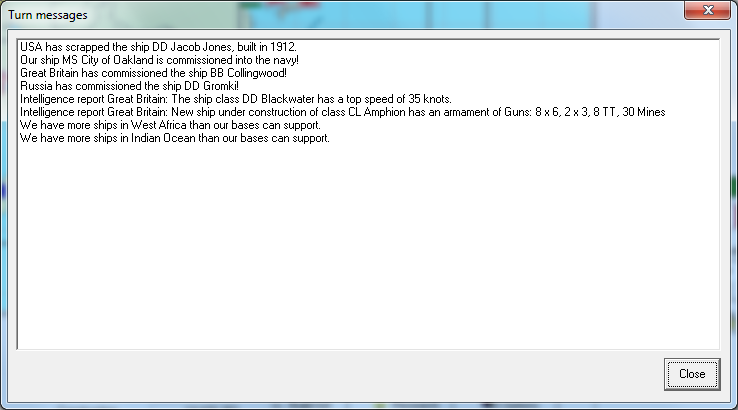 December 1929
December 1929
Danubian banks were the next to get hit, as a stock market fall in Vienna on December 9th prompted a bank run. Danubian authorities acted quickly, declaring a bank holiday.
The shockwaves flowed outward: Serbia had a run on its banks four days later, and on the 16th it was Rome's turn. London took another shock on the 18th despite word from New York that a dip in the stock market was being absorbed by concerned bankers buying stock to shore investor confidence. It was San Francisco's turn on the 23rd in what became known as the Christmas Crash, with an eight percent slide in value. A consortium of investment banks led by John C. Callum's First California National Bank pledged credit for when trading resumed on the 26th, looking to thwart any further slides.
The Garrett House
West Portland, Oregon
25 December 1929
It was to be the last Christmas that Admiral Garrett spent in the Portland house.
And it would not be as lonely as the previous year's.
Rafael was home, now a Captain who had finished Aviation School just before the "Tanganyikan War" - as many were now calling the recent conflict with Germany - and who was slated for his first capital ship command after New Year's, the large cruiser
Epaminondas. He and Georgia came with the children - Rachel, Catherine, and Rafael Jr. - and Georgia was in her second trimester for a fourth child, giving the Admiral eight grandchildren.
Thomas was present this year. The heads of Government offices didn't get sent out for Christmas political dinners. Anne-Marie was on his arm and their four children, three of them now ten or up, had jostled with their cousins for the chairs at the end of the table. Which was now two tables placed end-on-end, as if the Admiral was hosting a society dinner (a rarity for him indeed).
While everyone waited on Ms. Freeman to finish cooking the dinner (for a meal this big she had brought her nieces to help, and the Admiral had cheerfully offered to pay extra wages for both of the college-aged girls) talk was again dominating the table. WIthout their mother or Sophie to keep the topics on track for the season, Thomas and Rafael had brought up Monday's stock market crash. "I've heard that more may happen," Thomas warned everyone. "Pa, you've invested, right? Keep an eye on them."
"I have not invested too much," he answered.
"Still, be careful," Thomas insisted. "Raffie, you might want to sell anything you've bought."
"You are being paranoid, Tom. It's just a market correction," insisted Rafael. "Besides, I'd never risk my family's financial well-being with speculation. I've kept my investments to a sane level. Just enough to provide for Georgie and I when the time comes for me to retire."
"Good. Good." Thomas looked again to the Admiral. "Pa, I know you'll have your pension, but the Trust isn't giving you anything financially. Are you sure you'll be okay?"
"I'm quite sure, Tom. Quite sure. Your mother and I saved carefully over the years."
"Right."
"Dad, calm down," John urged. "You've got enough stress trying to run the Solicitor-General's Office."
"It can be a drain, yes, John. But I am allowed to worry about the family."
Georgie shook her head. "It might not last long. My father thinks that Green won't be able to maintain the current government if the stock market keeps dropping. The Liberals won't allow him to pass the banking laws he and the President are talking about."
"I doubt the Liberals can form a government, though. If Green's government falls, we could be looking at a new election."
"That might be what the country needs," said Thomas. "The Abernathy faction of the Liberals is too hidebound to economic dogma to realize we might have to make reforms to the national banking system. Have you seen how many people play in the markets? And I've heard it's even worse in America!"
"Such tantalizing Christmas conversation," the Admiral mused.
The two brothers, and Georgie, stopped. They looked at each other and lowered their eyes. "Ma would have shut us up by now."
"She would have," agreed Rafael.
"So when are we goin' to have Auntie Gabbie in for Christmas?", asked David. "Is she still away?"
Thomas gave his son an almost despairing look. The Admiral bowed his head. "I am not sure," he admitted. "She hasn't told me when she will be back."
"Mama says this is our last Christmas here, Pappi," Rachel said. "Why?"
"I am leaving next month," he said. "I have a new home."
"Is the Navy sending you away like they do to Papa?"
There was clear hurt in Rafael's eyes, since it was clear his daughter was often saddened by his time away from home. The Admiral shook his head. "No, little one. I'm retiring from the Navy."
"So you're not going to be in the uniform with the sparkly medals anymore?"
He smiled and shook his head. "Not nearly as often, no. Only at official functions."
There was, in the distance, a knocking at the door. Mei-Ling was quick to get it. There was hushed conversation as she took the raincoat of the new arrival and, given what was being said, helped direct the placing of bags too.
The Admiral was standing up and turning just as Sophie entered the dining room, wearing a green blouse and black winter dress. "Ah, Sophie," the Admiral greeted his daughter, smiling.
"Auntie Sophie!", cried Rachel. She jumped from her chair to greet her aunt as did a number of the other children.
"Papa," she answered. She opened her arms and pulled him close.
"Arrived on Christmas again? I'm beginning to think this was intentional!"
"This time it was!", laughed Sophie. She took turns hugging her nieces and nephews. "I got off the train on the 23rd just to delay my arrival for Christmas." She looked healthy and fit, with a bit more weight on her to fill her out.
Hugs from her siblings came next. "But I knew I had to be back tonight," Sophie said, "So I made sure of it. Our last Christmas in the house."
"Now if only Gabbie could make it," Rafael lamented.
Sophie's eyes lowered. There was nothing she had to say about that.
At that point Ms. Freeman's bell rang loud. "I'm bringin' it in!", she bellowed.
"Alright, children, back to your seats," the Admiral insisted. "And make room for your Aunt Sophie. The geese are on the way!"
And indeed they were - two plump, cooked geese on a tray cart pushed by Ms. Freeman. Three nieces from ages fifteen to nineteen came from behind with their own loads of food for the table.
It was their last Christmas in the house, and it would now be one to remember.
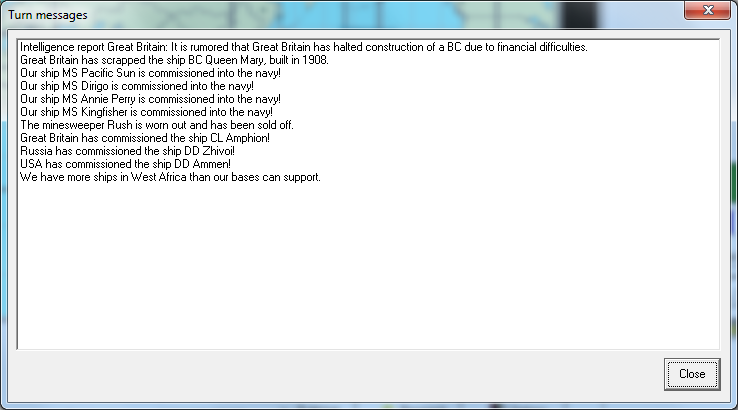
On December 31st, an officer from the Office of Naval Design and Procurement delivered a note to the office of Admiral Garrett. Testing with welding hulls for new ships proved the concept viable, offering further savings in structural weights for vessels. A final report was expected to be released after the New Year.
January 1930 - End of Game

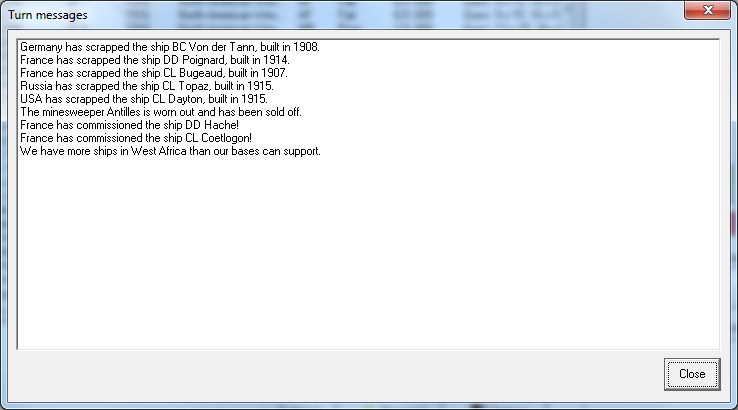
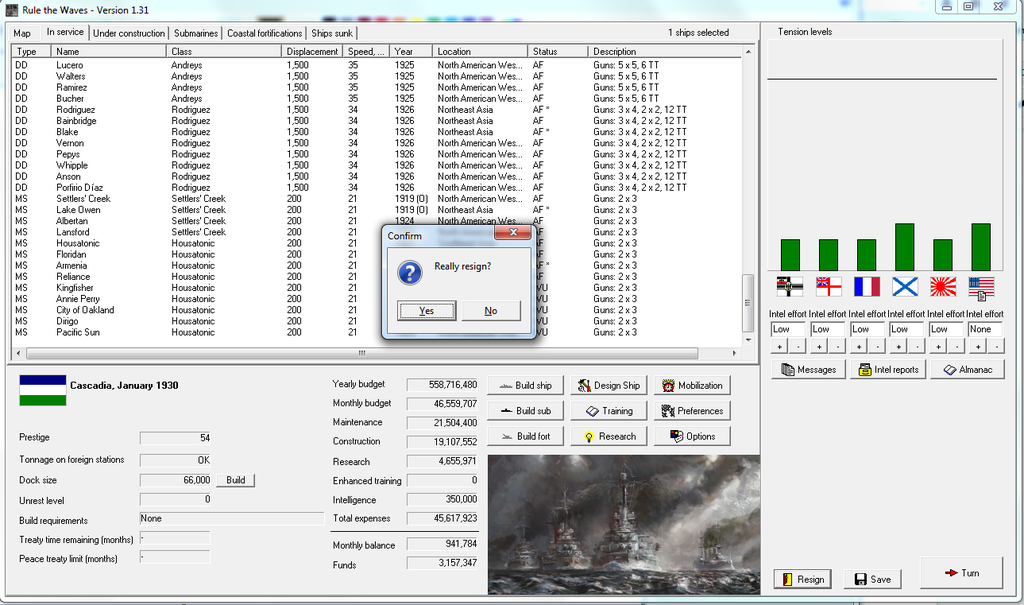 The Garrett House
The Garrett House
West Portland, Oregon
1 January 1930
On that Wednesday, the first morning of a new year and a new decade, Fleet Admiral Stephen Garrett rose from bed at 0600 sharp. The day would thus begin like many others. A shower, a trimming of his snow-white beard, a hearty breakfast cooked by Judy Freeman in which he enjoyed Sophie's company, and then to his bedroom to get into his blue-gray naval uniform. He put his cover on his head and went downstairs, where Mei-Ling waited with his officer's raincoat. He slipped it on over his uniform jacket and, with a nod from his housekeeper, stepped out into the cold rain.
It was the rainy season. Just as it had been that day thirty years ago. Thirty years ago he had done this same ritual. But Sophie had been just three years old and had slept in. Mei-Ling was still living in China as an adolescent. Tom and Raffie had been the ones to see him off…
...as had Rachel, who had given him a good luck kiss.
And the cab hadn't been an automobile. It had been a hansom cab, drawn by a horse. And waiting for him had been…
With a head of gray hair and his own great raincoat, Captain (Ret.) Reginald Etps was waiting for him. "Admiral," he said, saluting just as he had done thirty years ago, with a weathered, aged version of that same impeccable English accent.
"Reg." The Admiral looked at him with some surprise. His old aide was in his sixties now. Arguably he shouldn't be out in the cold any more than the Admiral should be. "What are you doing?"
"Well, I have the time." A sad little smile came to Reggie's face. "With Melvin gone, I mean. I know how you felt now when Rachel… well, let's not dwell on that, we are now old men and we will catch our cold out in this rain."
"Yes. We will."
The Admiral got into the cab beside Reg. "I thought it fitting," he continued. "This is where it began, after all."
"I distinctly recall when a fire-eating young Lieutenant first stepped aboard the
Valiant, acting and certainly sounding as if he were a Royal Navy officer ready to win land for his Queen and Country," replied the Admiral with a sardonic smile.
Etps grinned. "And you were the Executive Officer tasked with whipping me into shape." He shook his head. "But let's be honest, sir. However great your services as an officer aboard a cruiser, or as the victor of Manila Bay… even those will merely be the build up for your time in the Admiralty. The man who gave to the world the battlecruiser and the sovereign, who led Cascadia through four wars as Chief of Naval Operations and made our nation the third greatest naval power on the seas. Certainly the greatest naval power on the Pacific."
"The fool who didn't retire when it was time," grumbled the Admiral, "and who robbed his wife of the happiness of what was to be her final years."
Etps shook his head. "You could no more have retired in 1915 than Nelson could have avoided Trafalgar, sir."
"Perhaps not." The Admiral shook his head. "But not a day goes by that I don't wish that I had."
Etps nodded. "I understand that pain, sir, I do. I feel it all of the time myself."
They said nothing more. The cab crossed the Willamette into the Federal District and made its way to the Admiralty. It had been a new building at the start of the century. Today, it was not as new as other structures that had begun to rise in the Federal District.
Just as before it was a Marine who opened the door for them. Inside an entourage waited. Vice Chief of Naval Operations Phillip Wallace saluted. "Sir," he said. His uniform now had a fifth star upon its rank insignia, and an extra band of gold on the cuff. It was the first day he was wearing said uniform.
Nothing more was said. He went to his office, with Etps as his guest. The retired Admiral Holmes was also in attendance, as was every naval officer who had ever been an aide (save for now-Rear Admiral Reynolds, currently serving as Commander of the East Asian Naval Command), and the rest of the Admiralty. Representative Arnoldo Guzman of New Mexico, the Naval Secretary, was present as well.
The Admiral's office still had the maps, the writing utensils, everything that was official Navy property. Only his portraits and photographs had been removed. He stepped up to the desk and looked to the assembled officers. "This is it," he said, mustering his strength for his voice to come loud and clear. "I have served in this building for thirty years. Twenty-three years and nine months, I have been Chief of Naval Operations, and beforehand I was Vice-Chief of Naval Operations and the Chief of Naval Design and Procurement. I am told that there are few, perhaps none, in the history of the world's Admiralties who can match my time in office and my influence upon our nation's Navy as an institution."
"If they are right, I pray that my influence has proven a positive one for the men of our Service, the men of the sea. Our work is a lonely one. Unlike our Army comrades, we spend months, years, away from our loved ones in service to our country. Due to the nature of our borders and our holdings, Navy and Marine men have usually been the first to shed our blood when our nation goes to war. And yet, for all of these woes, I could never ask for a higher calling than my service in this Navy. I have spent nearly sixty years in service to the Navy of the Cascadian Republic and I would not take that back."
Reg lowered his eyes briefly, and Wallace shifted slightly. Both men knew that while he would not take back his whole service, he desperately wished it had been ended fifteen years ago.
"I have carried the torch for the Navy for over twenty years. Now it is time that I pass that burden on to the generation of officers who followed me. May God bless you with the wisdom, integrity, and courage to see our Navy through to the next generation."
At that, he reached down to the desk and picked up the one paper left on it the prior day. He handed it to Naval Secretary Guzman, who held it up and adjusted his spectacles briefly. When he spoke it was with a refined Spanish accent speaking in excellent English.
To the Naval Office of the Republic of Cascadia,
In light of the retirement of Fleet Admiral Stephen T. Garrett, effective on the First of January in the Year Nineteen Thirty, Admiral Phillip J. Wallace is hereby promoted to the rank of Fleet Admiral. Fleet Admiral Wallace is ordered to relieve Fleet Admiral Garrett of his duties and to assume the post of Chief of Naval Operations of the Cascadian Navy on the aforementioned date.
Signed,
Alonso Muniz
President of the Republic of Cascadia
The Thirtieth of December, Nineteen Twenty-Nine
Guzman handed the letter to Wallace, who read it himself, quietly. After doing so he looked to the Admiral and saluted crisply. "Fleet Admiral Garrett, sir, I am here as ordered to relieve you of your post."
The Admiral returned the salute crisply. "Thank you, Fleet Admiral Wallace. I stand relieved." Ceremonially he stepped away from the desk and allowed Wallace to step up to it.
"I will be brief," Wallace said, as he looked to his predecessor. "Admiral Garrett, I thank you for your years of service to the Navy and the Country. I will remember with pride the days you gave me every command, every post, I have held in this Navy, as I am sure many of those assembled will do. You have molded the Service into one of the finest on the planet. I may even say it is the finest. The Royal Navy itself could not find fault with what we have become due to you. I consider it my duty to continue commanding this Navy with the same principles you have bestowed upon us in the generation you have been in this office. Thank you again, sir, for all you have done."
Polite applause answered him.
The day was not quite over. The Admiralty, as a whole, departed for the Navy League Club in a convoy of taxicabs, where the Navy League held a celebratory luncheon to welcome the new Chief of Naval Operations and see off the old. This time his family was there, entirely, sitting and listening as the attendees gave him their heartfelt sendoff. Admiral Garrett was made, by unanimous vote of the Club, a member for life, and the Navy League named him Co-Chairman of the Navy League Governing Committee. Three former Naval Secretaries gave him parting farewell addresses and welcomed Wallace to his new posting.
The arrival of President Muniz was a delightful surprise. He came toward the end of the luncheon, although he did not speak or participate.
When the luncheon was over the family left to return to the House. Christmas dinner had been just a week prior, so for the day dinner would be primarily cold meats and finger foods. Standing with Etps in his parlor, the Admiral said, "I plan to be in Astoria in two or three weeks. It will take me that long to finish dividing my private family papers and correspondence with my papers relating to the Navy."
"If anyone has earned retirement, sir, you have."
He gave Reg a slight smile. "Come now, Reg. It's just 'Steve' now. I'm retired."
"You will always be 'sir' to me… sir… Stephen."
"Ha!"
"Uncle Reggie!" Raffie appeared at the door with his little boy. "I don't think I've introduced you to Raffie Junior, have I?"
"No, Raffie, you have not," declared Reg. He looked the little boy in the eye. "Hello Raffie Jr."
"Hello Unkie Reg," the toddler replied.
"Let me take you to Catherine," Rafael said. "She's with Rachel and their cousin Gabrielle in the old playroom."
This gave the Admiral a moment alone until Sophie arrived at the door. "Papa, you want me to do the biography?", she asked.
"Why wouldn't I?"
"Well, you are a writer yourself…"
"But I am, as a historian, an amateur," he countered. "You have your schooling, your education, to support you in a proper account of my life."
"But I can hardly be objective…"
"You will be plenty objective," he insisted. "I raised you to be honest, after all. And yes, you will have full access to the papers here… after the Navy censors decide which ones have to be locked up for another half-century anyway."
"Right." Sophie sighed. "Very well. I'll do so. But I would like you to join me."
"Hrm?"
"Write about your life, Papa," she said. "I mean, when you get to Astoria. Sit at a typewriter or with your pen and paper and write about things. How you look back on everything. I think it will give the book a special feel to it that I can't do by myself."
Seeing his daughter meant that, the retired Admiral sighed. "Alright," he said. "I shall do so."
With that agreement made, they looked to the window that showed the backyard. The rain was still drizzling down. "Papa, I'm going to miss it," Sophie said. He could hear her voice breaking and turned to face her. Tears streamed down her cheeks and she started to sob quietly. "This was my home for so long…"
"Your name is in the Trust," he said. "You can live here whenever you like, for the rest of your life."
"I know." She nodded. Tears still came. "But it's not just that, Papa. Before… you were always here, even if Thomas and Raffie and Gabbie weren't. But now you'll be gone too. It's like there's nothing left of when I was little."
"I know." He gently embraced his daughter. His tears began to flow too as he thought of everything that they had done in this house, of everything the family had been so many years ago, and how it had all eventually flowed away. "But that's the way life is. Just like the sea, it goes on and on…."

